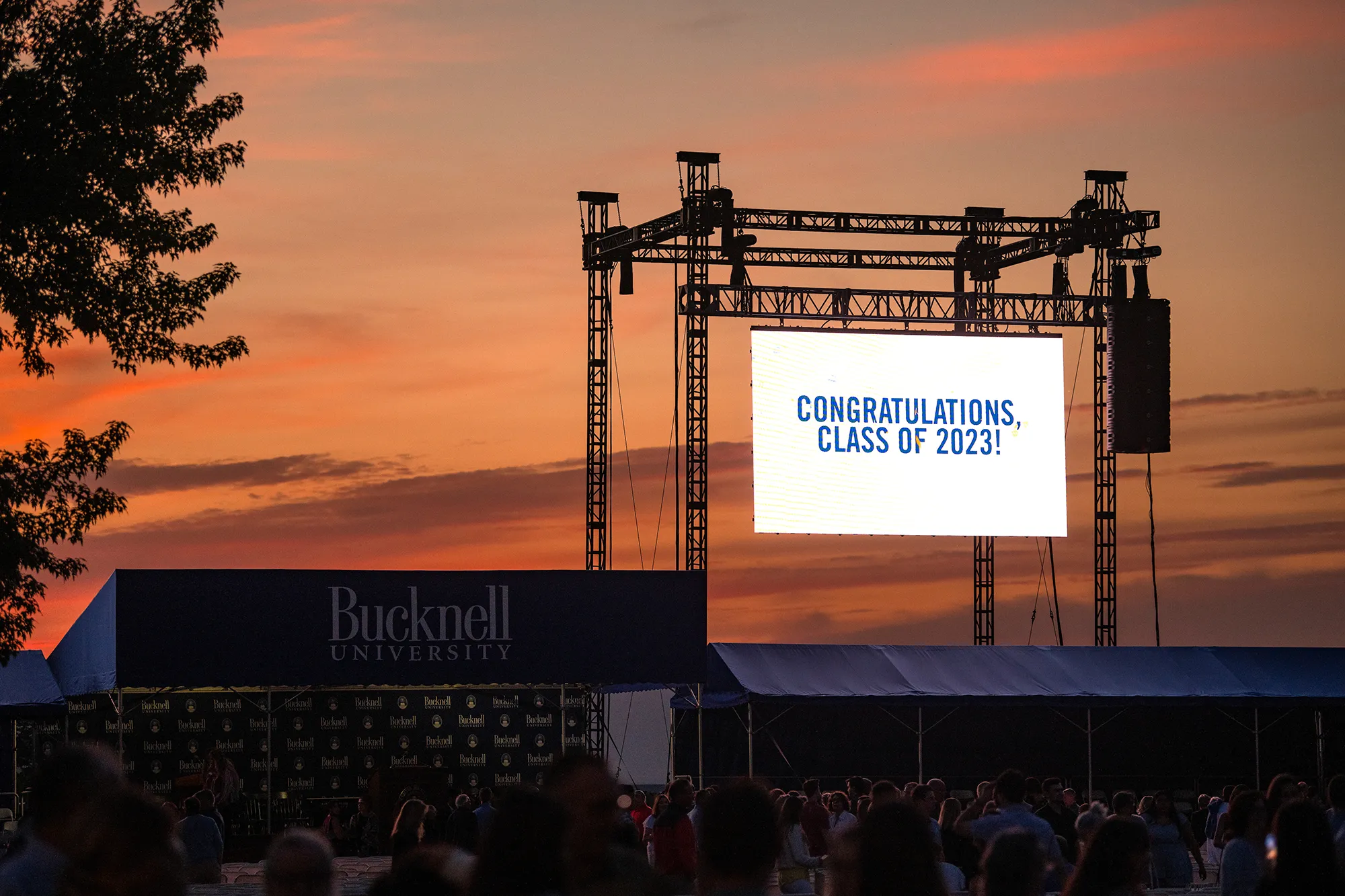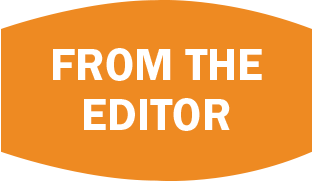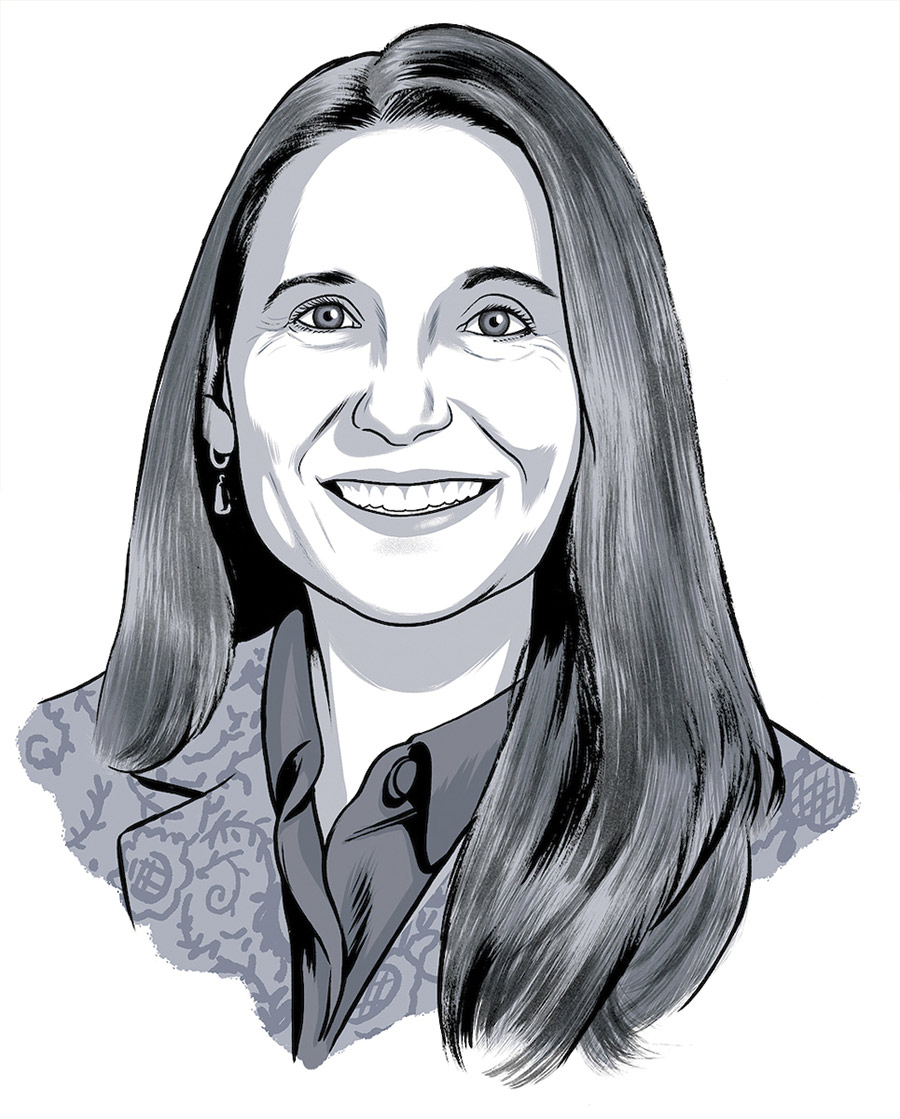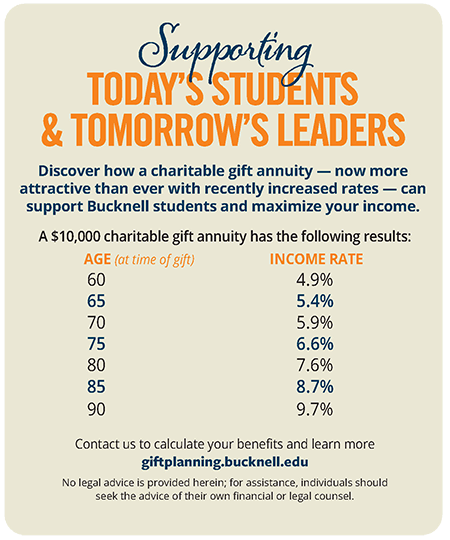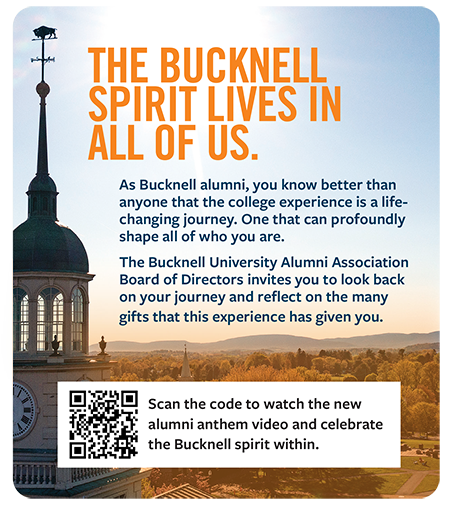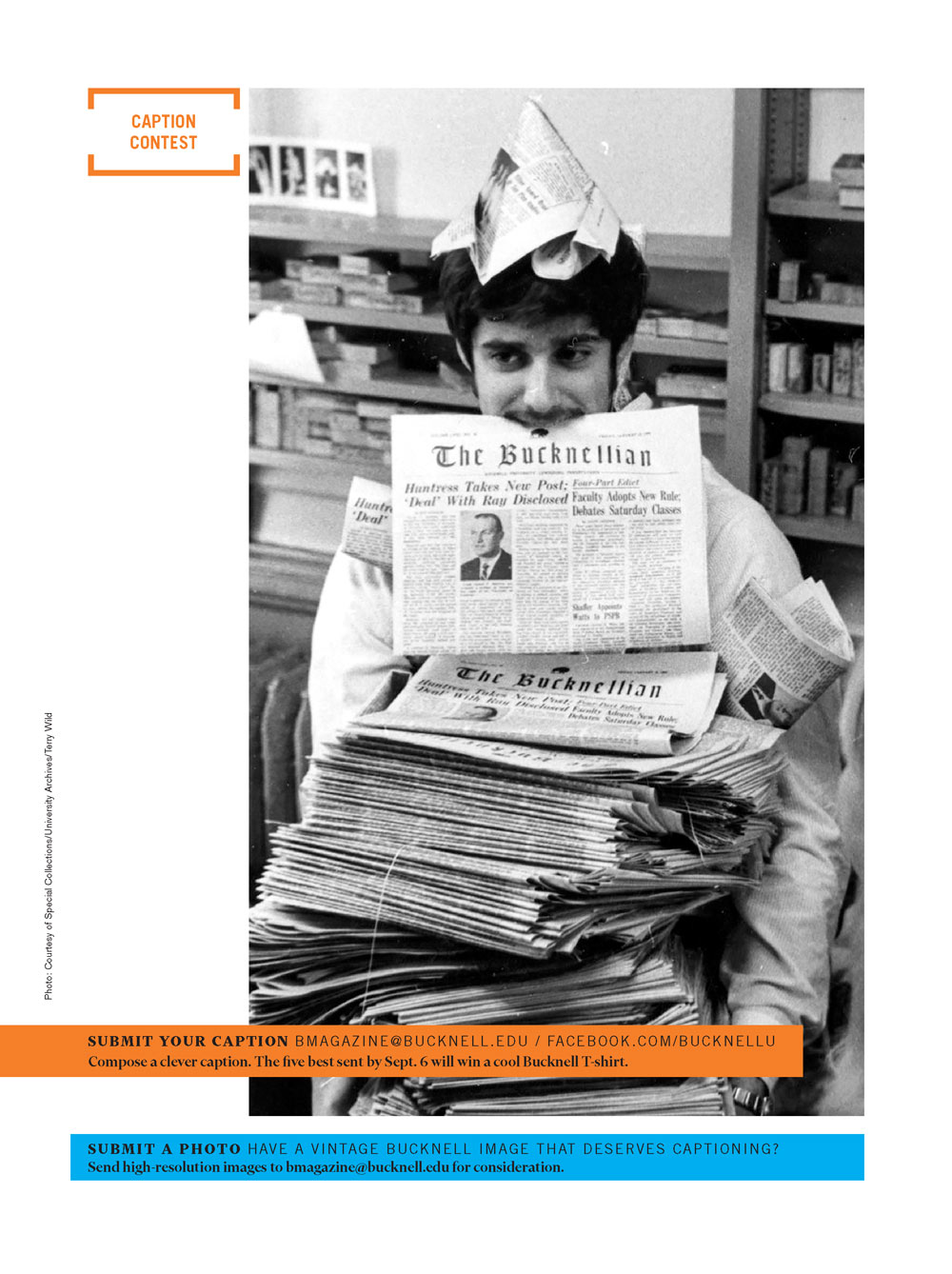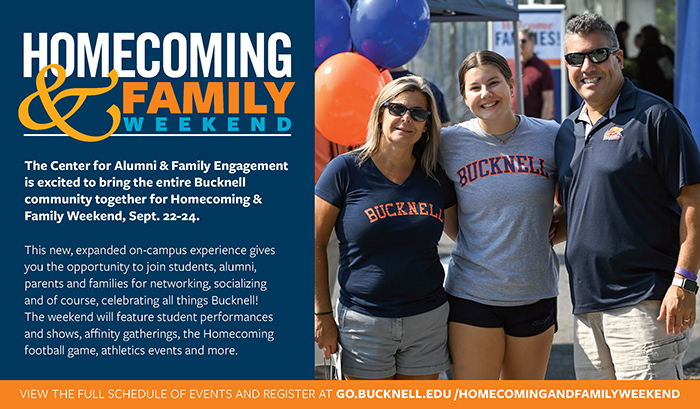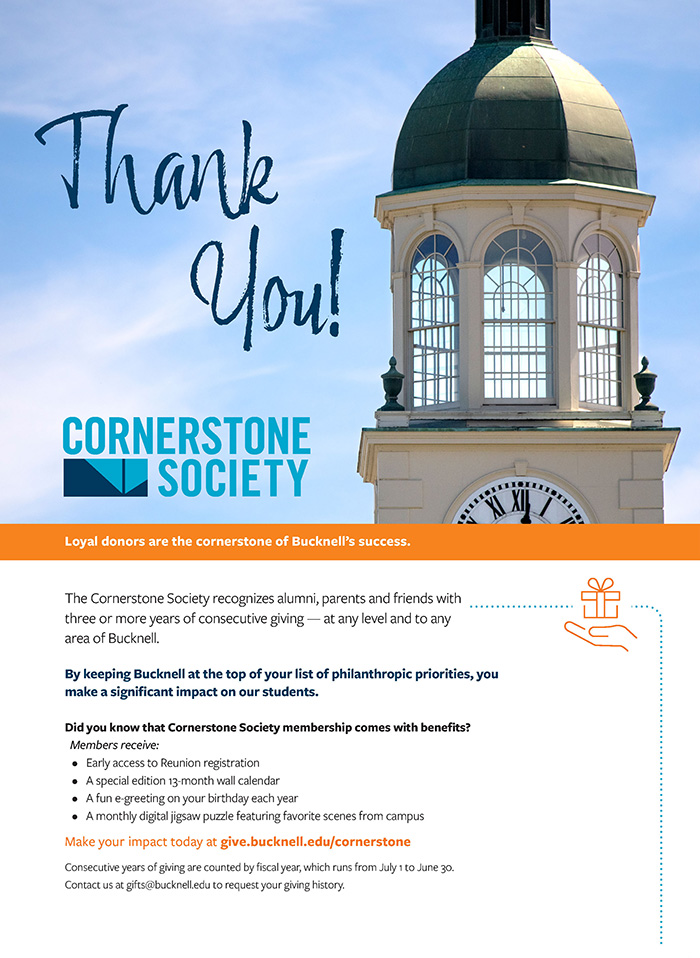Bucknellian pride bursts in the air during Reunion Weekend.
If you would like a reprint of this photo, please fill out the form at go.bucknell.edu/PhotoOffer. We will send you a complimentary 8-by-10 print.
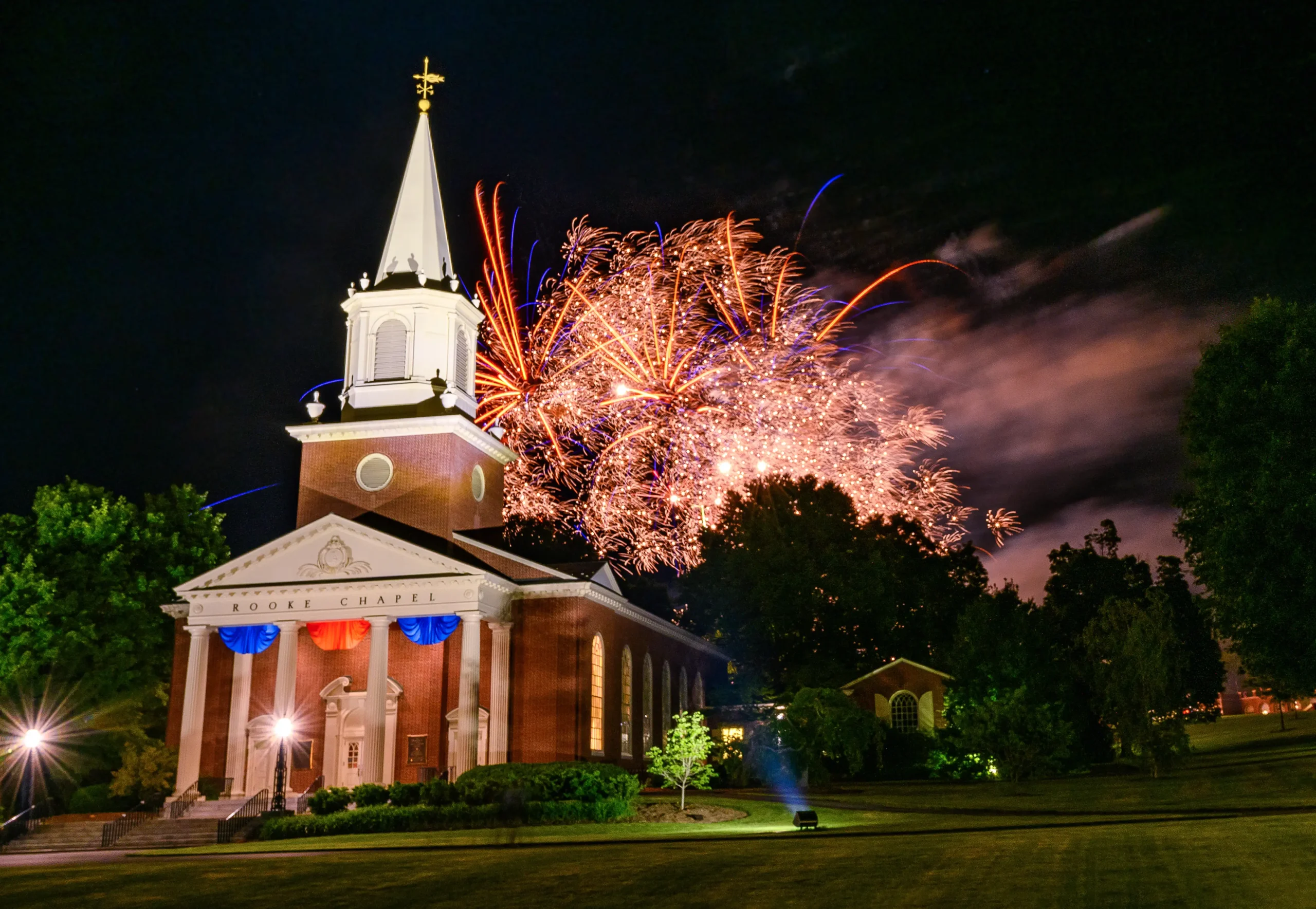
BY WAY OF BUCKNELL
Bucknellian pride bursts in the air during Reunion Weekend.
If you would like a reprint of this photo, please fill out the form at go.bucknell.edu/PhotoOffer. We will send you a complimentary 8-by-10 print.
Pathways
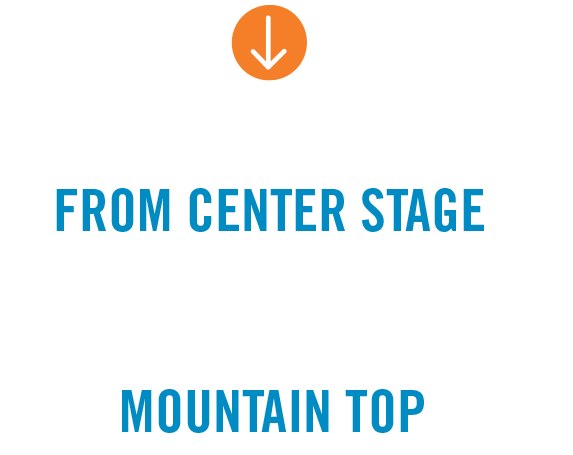
by Amy Downey
Bucknell has helped the aspiring actor develop his range — from the complex Petruchio in Taming of the Shrew(s) to the witty Oscar Wilde in Gross Indecency: The Three Trials of Oscar Wilde. In 2022, he received the Juliet Shield-Taylor ’83 undergraduate theatre summer research grant, which enabled him to attend intensive training at the Tom Todoroff Studio conservatory in New York City. “I’ve always been fascinated with being on stage and taking on someone else’s life,” says Fournier, a theatre and political science double-major from Mechanicsburg, Pa.
Fournier’s ambitious nature keeps him reaching for new heights, and not just in academics. In 2022, he summited Mount Kilimanjaro with Bucknell’s Outdoor Education & Leadership team. “For acting, you have to be completely in the moment, and then in the moment after that. When you’re climbing a mountain, it’s the same thing,” says Fournier, who has his sights on Argentina’s Aconcagua and California’s Mount Whitney. “As a student, I’m often pulled into lots of directions, so it’s nice to completely home in on one goal and throw my whole being into it.”
photograph by emily paine
Pathways
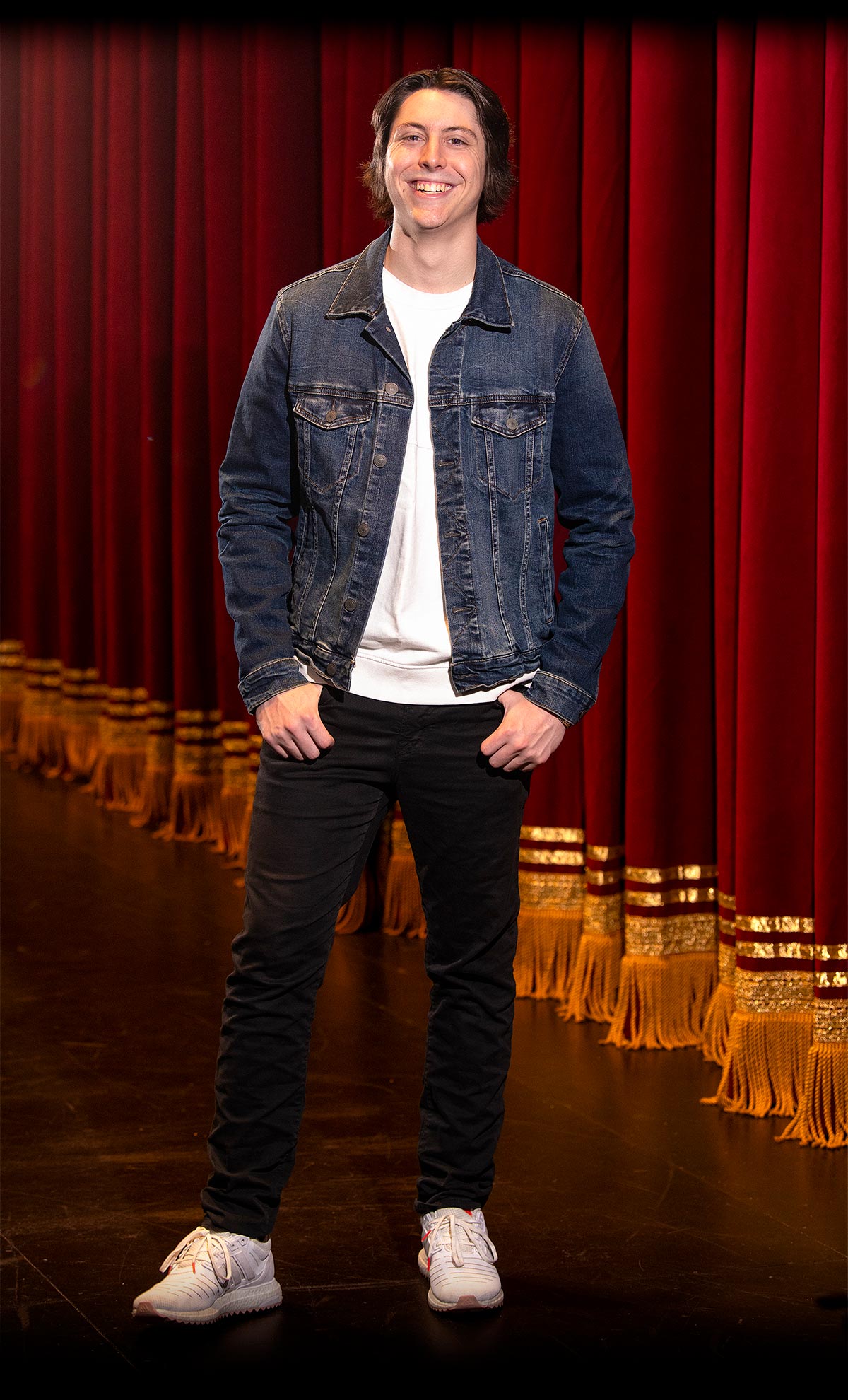

Bucknell has helped the aspiring actor develop his range — from the complex Petruchio in Taming of the Shrew(s) to the witty Oscar Wilde in Gross Indecency: The Three Trials of Oscar Wilde. In 2022, he received the Juliet Shield-Taylor ’83 undergraduate theatre summer research grant, which enabled him to attend intensive training at the Tom Todoroff Studio conservatory in New York City. “I’ve always been fascinated with being on stage and taking on someone else’s life,” says Fournier, a theatre and political science double-major from Mechanicsburg, Pa.
Fournier’s ambitious nature keeps him reaching for new heights, and not just in academics. In 2022, he summited Mount Kilimanjaro with Bucknell’s Outdoor Education & Leadership team. “For acting, you have to be completely in the moment, and then in the moment after that. When you’re climbing a mountain, it’s the same thing,” says Fournier, who has his sights on Argentina’s Aconcagua and California’s Mount Whitney. “As a student, I’m often pulled into lots of directions, so it’s nice to completely home in on one goal and throw my whole being into it.”
Pathways
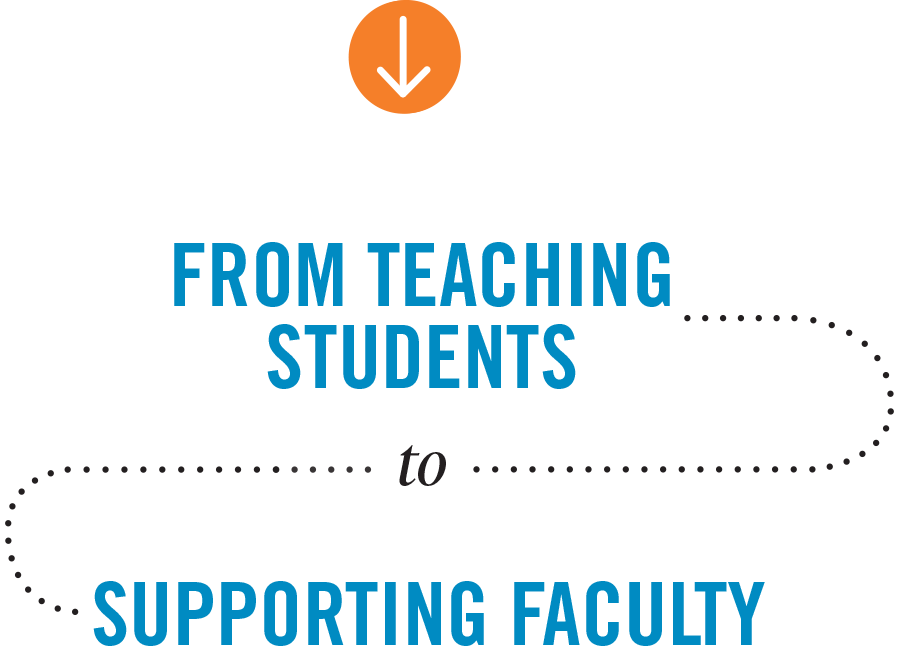
by Katie Neitz
In 2016, Kingué faced a crossroads. A university in St. Louis offered her husband a position and was eager to create one for Kingué. The prospect prompted reflection. “It became clear to me that if I had received more mentoring and support from Bucknell, I might have been more aware of opportunities available to me and could have navigated the academic world better,” she says.
Kingué shared this with President John Bravman, who responded earnestly, asking, “What would it look like to create an environment that supports underrepresented faculty here?”
The exchange eventually led to Kingué becoming special adviser to the provost for faculty development and, most recently, Bucknell’s first associate provost for faculty engagement & inclusion.
In her mentoring role, Kingué provides personalized support to faculty members from underrepresented groups. “When I first meet with faculty, I tell them they are the best — Bucknell only brings the best,” she says. “My job is then to help them meet the demands and expectations of their academic work so they can do their best teaching and scholarship. Our space is still under construction — it’s not perfect — but we are committed to building a community where faculty want to stay and put down roots.”
To learn more about Kingué’s work, see “Cultivating a Talented, Diverse Workforce”
photograph by emily paine
Pathways
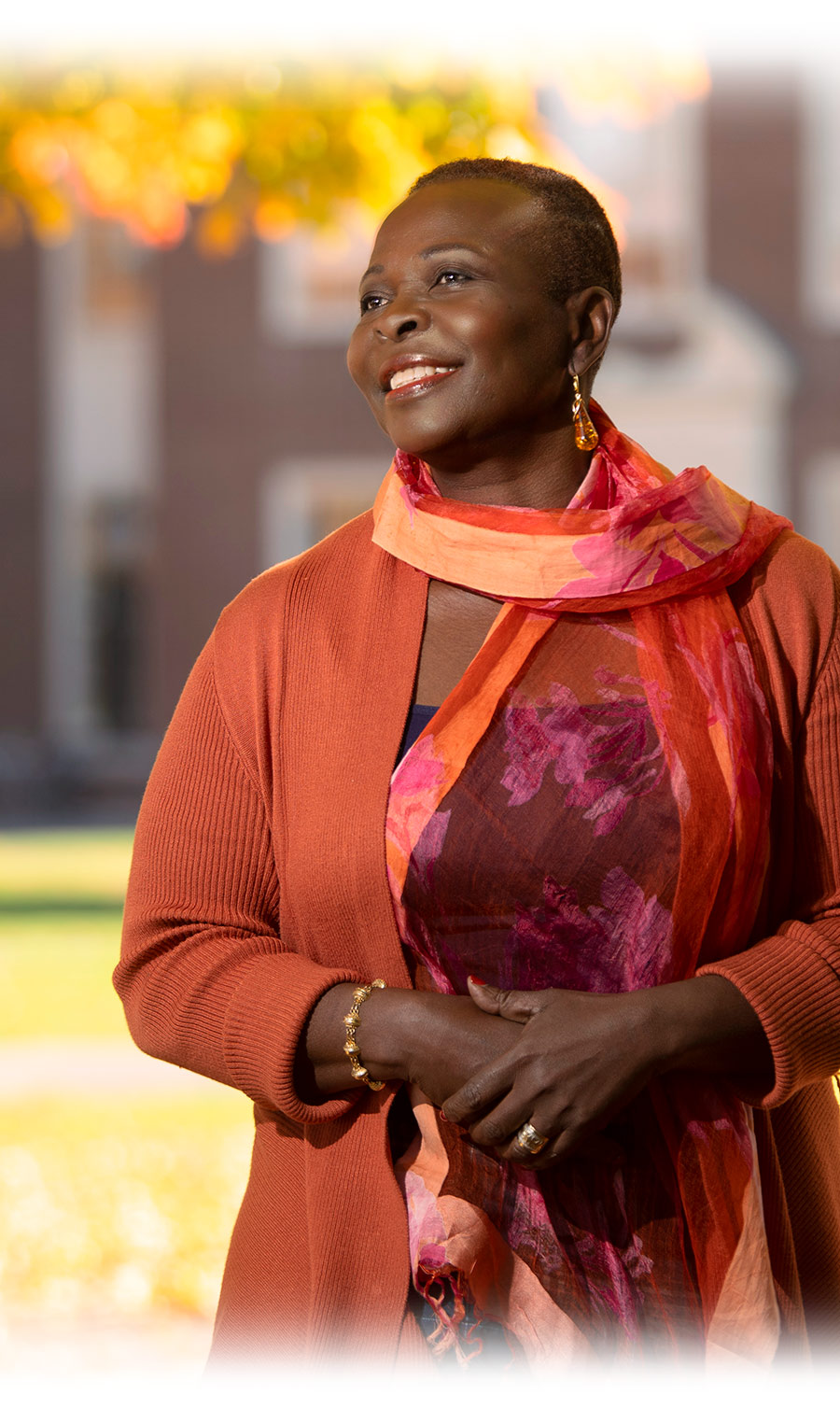

In 2016, Kingué faced a crossroads. A university in St. Louis offered her husband a position and was eager to create one for Kingué. The prospect prompted reflection. “It became clear to me that if I had received more mentoring and support from Bucknell, I might have been more aware of opportunities available to me and could have navigated the academic world better,” she says.
Kingué shared this with President John Bravman, who responded earnestly, asking, “What would it look like to create an environment that supports underrepresented faculty here?”
The exchange eventually led to Kingué becoming special adviser to the provost for faculty development and, most recently, Bucknell’s first associate provost for faculty engagement & inclusion.
In her mentoring role, Kingué provides personalized support to faculty members from underrepresented groups. “When I first meet with faculty, I tell them they are the best — Bucknell only brings the best,” she says. “My job is then to help them meet the demands and expectations of their academic work so they can do their best teaching and scholarship. Our space is still under construction — it’s not perfect — but we are committed to building a community where faculty want to stay and put down roots.”
To learn more about Kingué’s work, see “Cultivating a Talented, Diverse Workforce”
growing up
When it finishes flowering (in the next three to four months), the entire thing will keel over and crash to the ground, uprooting and killing the mother plant in the process. (It will die anyway, even if we cut off the stalk beforehand.) This Agave americana has put out dozens of baby plants (“pups”) that we’ve harvested and replanted in various places around our property. It’s amazing what nature has created!
Robert “Lance” Hicks ’73
Scottsdale, Ariz.
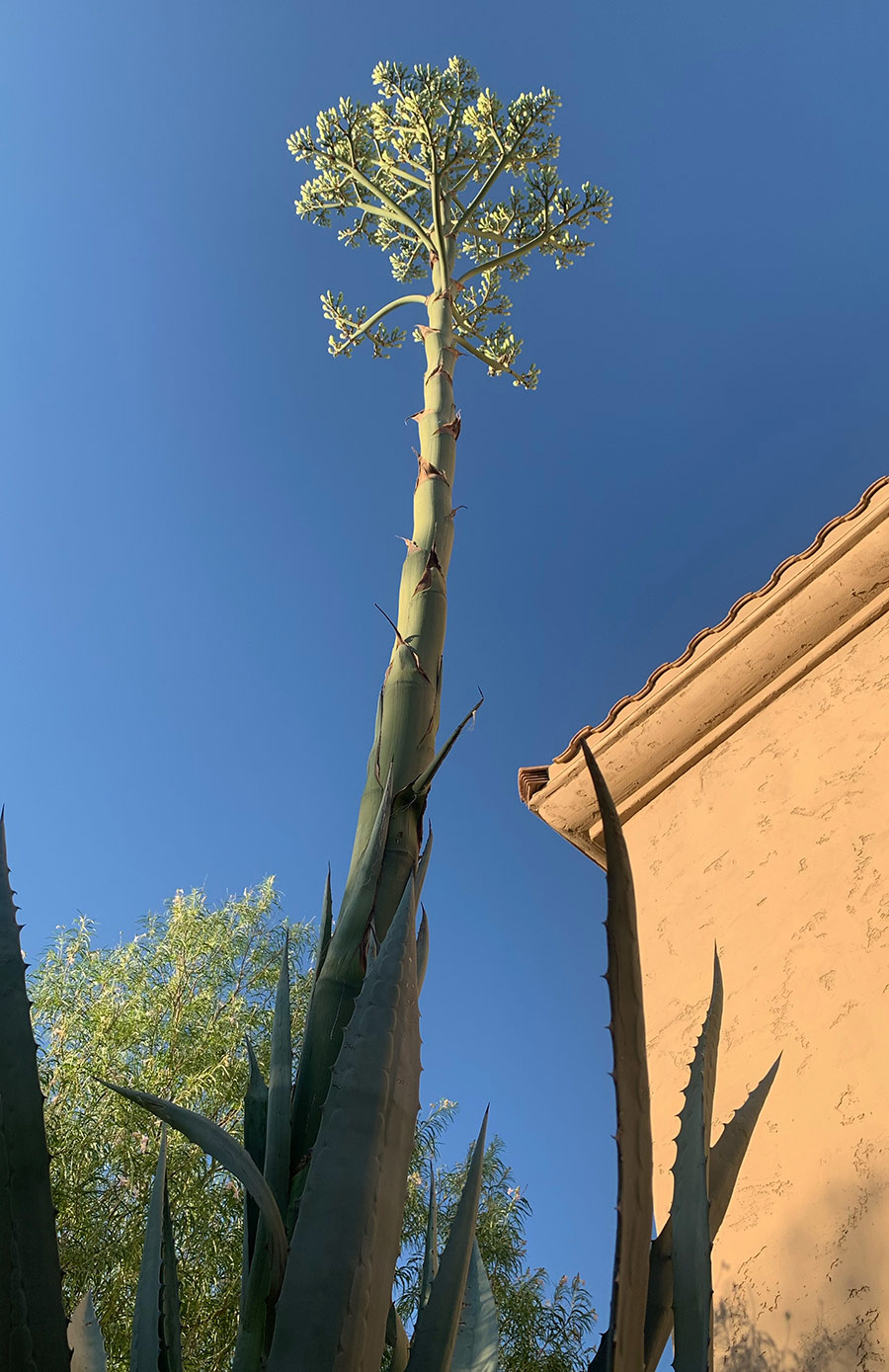
A Lasting Legacy
At one of our class reunions, Professor Turnure gave a class in art history that my friend and former roommate, Sara Thurber Marshall ’80, and I attended. I was astonished when I walked into the classroom to have Professor Turnure remember me by name. Reading about his lifetime accomplishments, I guess I shouldn’t have been so surprised.
Kathleen Torrant Sherrill ’80, P’15
New Haven, Conn.
MIND THE GAP
I regret not studying abroad in college. I grew up in a single-parent household and relied on aid and loans to support my education. In college, I was conscious of my finances and serious about accumulating experiences I viewed as directly transferable to a future career. With this narrow mindset, I didn’t even consider studying abroad. I dismissed it as too expensive and frivolous.
In my 20s, I traveled abroad for the first time to visit my younger — and wiser and more resourceful — sister who pulled together the necessary finances to spend a semester in Europe. During my stay, it was apparent she was collecting more than passport stamps. She was interacting with people from different cultures, trying new foods, navigating maps and train schedules (before smartphones!) and accumulating a wealth of priceless experiences. No regrets (aside from her short-lived eyebrow piercing, a souvenir from London).
Bucknell understands the incredible value of studying abroad — and also that the cost of these experiences can be prohibitive. This past spring, with support from the Office of the President, a pilot program enabled eight first-generation students to explore the art and culture of Amsterdam. I had the pleasure of speaking with a few participants, all of whom called the opportunity “life-changing” ( learn more in “Artistic Journey” ).
This program is just one example of how Bucknell is expanding access and opportunities to its students. Bucknell is working to ensure students of all backgrounds are able to take advantage of programs and resources that will help them learn, grow and thrive ( read more in “Equity Drives Success” ).
Bucknell alumni are actively involved in developing and supporting these efforts, which enables the University to be even more successful and reach more students. It’s a worthy endeavor, ensuring that future generations can enjoy a full, rich Bucknell experience — no regrets.
Comeback Kids
Heather Wilson ’70
Pittsburgh
Letters to the Editor Policy
The editors reserve the final decision to publish any letter — there is no guarantee that all letters received will be published.
All letters must be signed. The maximum length is 300 words. The editors reserve the right to edit letters for clarity and space. Writers may be asked to submit revised versions of letters or to approve editorial changes made by the Bucknell Magazine editor. After two issues, the debate on any topic will conclude. Some letters may be disseminated only online.
Views expressed in this magazine do not necessarily reflect the opinions of the editors or the official views or policies of the University.
Table of Contents

Volume 16, Issue 3
Heather Johns P’27
EDITOR
Katie Neitz
CREATIVE DIRECTOR
Barbara Wise
DESIGNERS
Amy Wells
Barbara Wise
PHOTOGRAPHY EDITOR
Emily Paine
DIGITAL EDITOR
Brooke Thames
ASSISTANT EDITOR
Kate Williard
CLASS NOTES EDITOR
Heidi Hormel
EDITORIAL ASSISTANT
Kim Faulk
Contributors
Dave Block
Shana Ebright
Mike Ferlazzo
Matt Hughes
Brad Tufts
Christina Masciere Wallace P’22
Website
bucknell.edu/bmagazine
Contact
bmagazine@bucknell.edu
Class Notes:
classnotes@bucknell.edu
570-577-3611
Bucknell Magazine
(ISSN 1044-7563), of which this is volume 16, number 3, is published in winter, spring, summer and fall by Bucknell University, One Dent Drive, Lewisburg, PA 17837. Periodicals Postage paid at Lewisburg, PA and additional mailing offices.
Permit No. 068-880.
Circulation
49,000
Postmaster
Send all address changes to:
Office of Records
301 Market St., Suite 2
Bucknell University, Lewisburg, PA 17837
© 2023 Bucknell University
Please recycle after use.
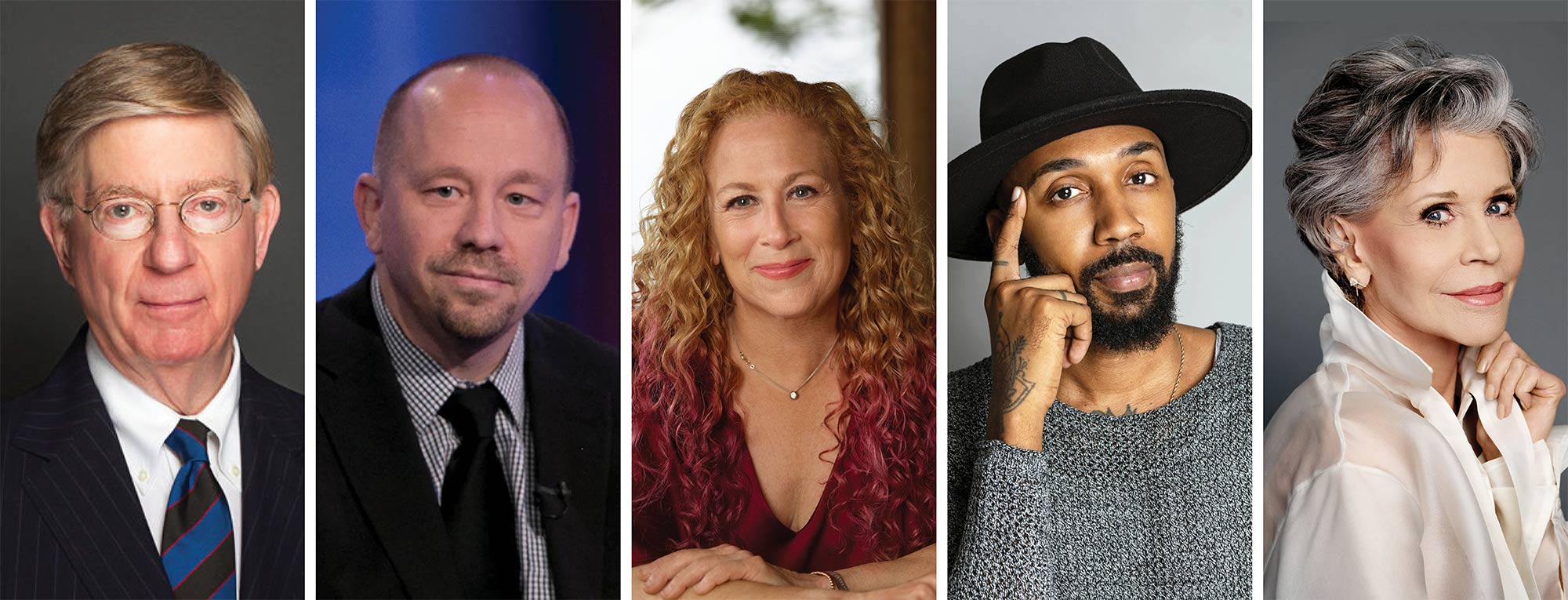
Critical Conversations
“Issues related to freedom of expression have increasingly drawn scrutiny on campuses, and been the topic of great debate across the country,” President John Bravman says. “We are proud to be providing this forum to discuss one of our most cherished American ideals with prominent individuals who have all encountered freedom of expression experiences.”
The 2023-24 lineup includes:
George Will, Sept. 19
Will is the country’s most widely read political columnist. His column for the Washington Post syndicate reaches 300 newspapers throughout the United States and Europe, and his voice has reached millions more through ABC’s Sunday political show This Week, on which he has served as a commentator since 1981.
News Ticker
CELEBRATING FIRSTS
HEAD OF THE CLASS
IT ADDS UP
’burg and Beyond
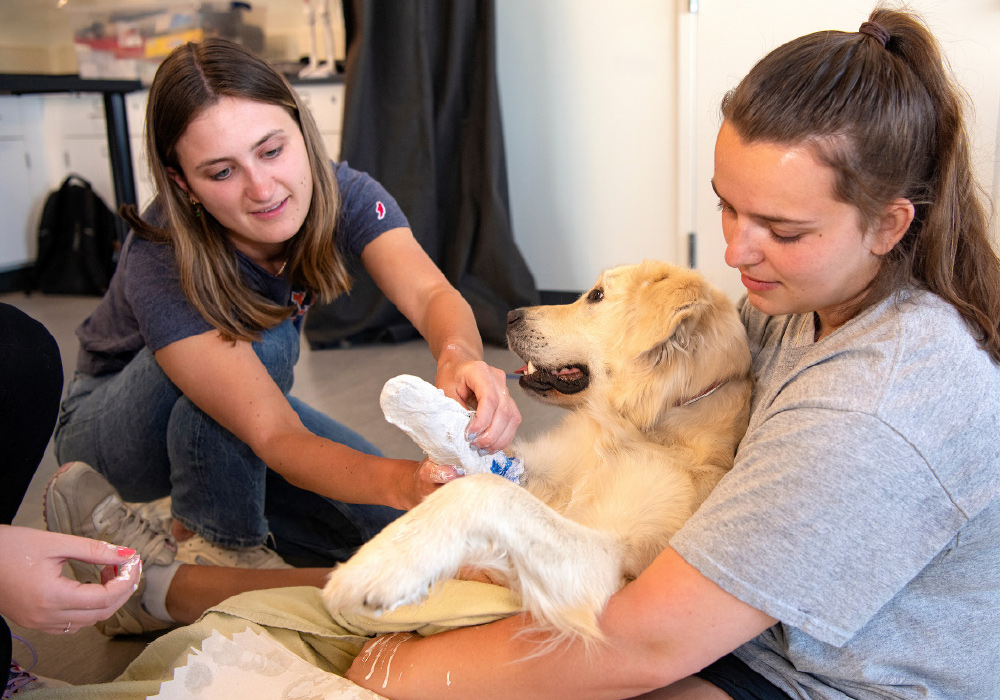


Lewisburg
Meet Doug, a two-year-old golden retriever born with three legs. Mary Ann Sigler Stanton ’89, who works as a director in University Advancement, and her family took in Doug after his previous owners could no longer care for him. When Stanton’s veterinarian said a prosthetic could reduce Doug’s risk of developing arthritis in his weight-bearing front leg, she knew just where to turn for help — Bucknell’s College of Engineering.
Their Challenge
Grace Adams ’23, biomedical engineering; Will Carcieri ’23, mechanical engineering; and Emma O’Shea ’23, biomedical engineering, had experience creating human arm, hand and finger prosthetics as members of Bucknell’s chapter of e-NABLE, a national organization that creates 3D-printed prosthetics for those in need. Designing a leg for a high-energy canine presented a unique set of challenges.
’burg and Beyond
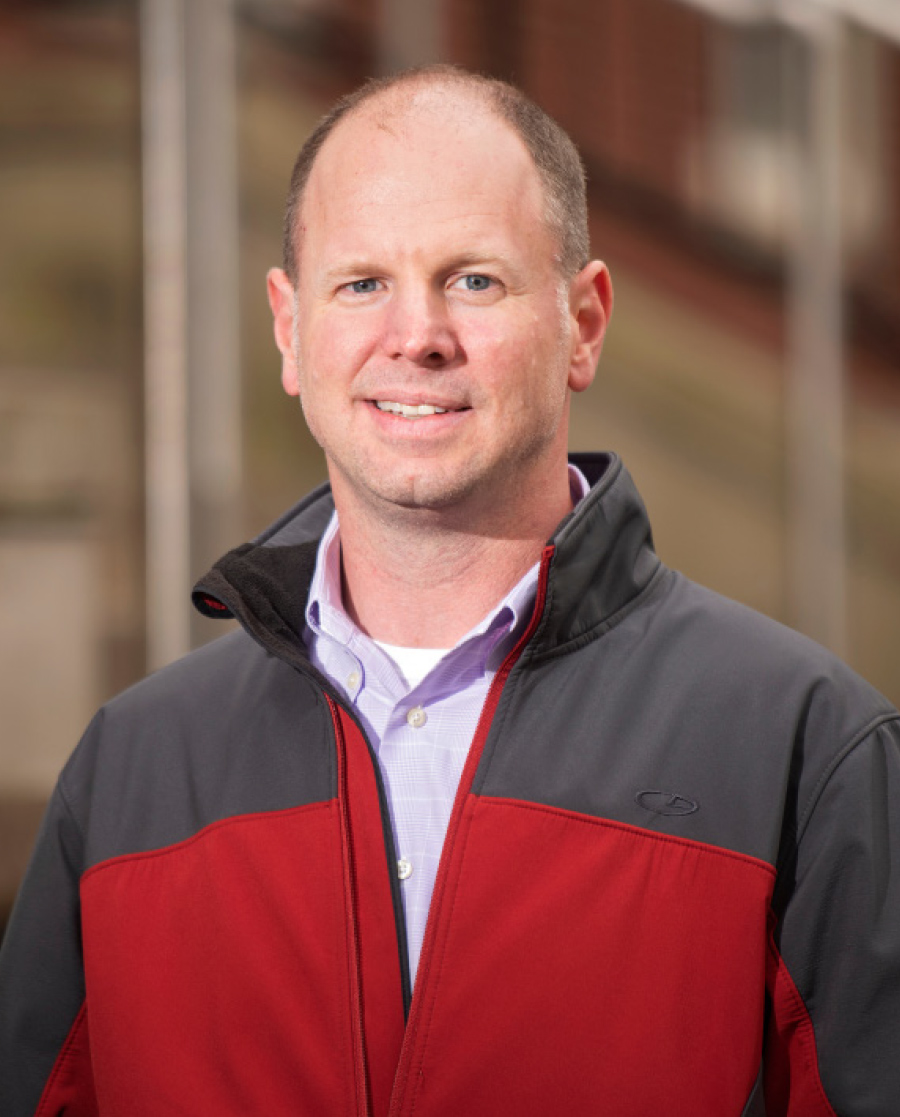


Playgrounds Nationwide
Parents around the country can thank Professor Eric Kennedy, biomedical engineering, for helping to keep their kids safe. Kennedy is an injury-prevention specialist who conducts research on playground safety. He collaborates with organizations, including ASTM International, the National Recreation and Park Association, and the National Program for Playground Safety, to ensure play spaces across the country are designed and installed so kids can climb, swing and slide — and stay out of harm’s way.
What He’s Done
One of Kennedy’s students, Drew Filchner ’22, completed an honors thesis that reported playgrounds to be the leading location of school injuries, making up one-third of all elementary school injuries. They recently published their findings in the peer-reviewed journal Clinical Pediatrics. “It’s not our intent to say that playgrounds are inherently dangerous — they are absolutely not. Most of the injuries are very minor,” Kennedy says. “But it does go to show that we might take these spaces for granted and often overlook risks. Design decisions, utilization practices and supervision all play a role in helping to mitigate injuries.”
Artistic Journey
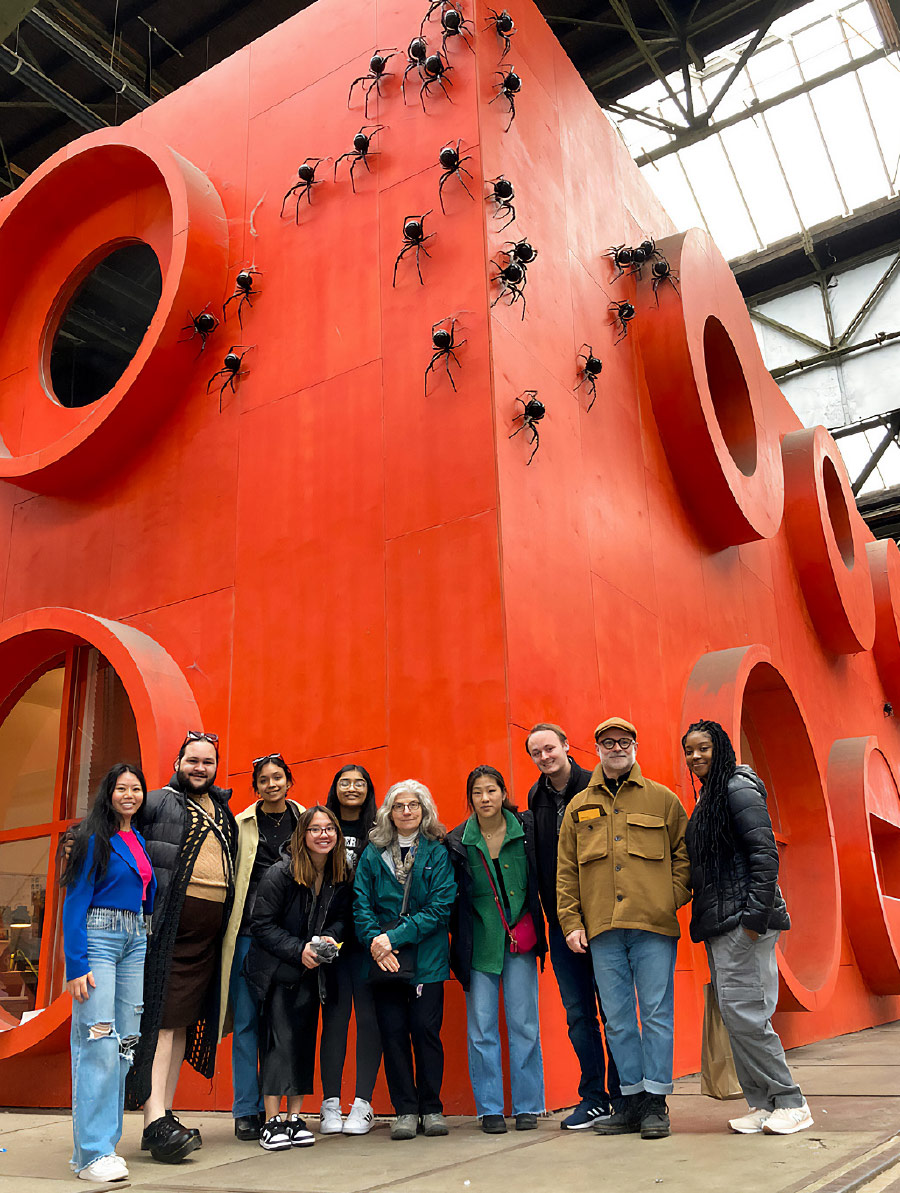

he value of studying abroad is priceless. Navigating an unfamiliar environment, becoming immersed in a new culture and interacting with people with different perspectives broadens students’ understanding of the world while helping them become more insightful, adaptable and empathic.
But the cost of studying abroad can be significant — and therefore prohibitive.
Bucknell wants to close that gap. In March, the University launched a new pilot program — Art in Amsterdam — that enabled eight first-generation students to spend spring break exploring the vibrant artistic culture of the Netherlands for less than $500. With support from the Office of the President, students’ travel, housing and most meals were covered. Out-of-pocket expenses were limited to passport fees and spending money for souvenirs and incidentals.


The Art of Acquisition
Through the new Trevisani Art Acquisition Program, members of Bucknell’s Samek Museum Art Club will coordinate the effort among students to select a piece of art each year for inclusion in the Samek’s permanent collection. The program will help students learn about art valuation, negotiation, acquisition and conservation through trips to art galleries and museums as well as on-campus visits by art experts. Students will review and analyze the pieces under consideration for purchase and engage in discussions that will ultimately lead to the selection of a new work of art.
“I have been passionate about art since taking Art in the Dark at Bucknell,” Trevisani says. “Not only for what art brings aesthetically, but also the history, research and analysis, diversity and evaluation of art as an investment. I’m honored to be part of introducing these dynamics to students.”


Rising to the Occasion
Now, with the encouragement of Coach Beresford “Ozzie” Brown II, she was attempting a new personal best: 5 feet, 7 inches.
“I leaned back, stood up on my toes, and stared down the bar,” Kates says. “I was motivated and amped up.”
And then, the markets, innovation & design major made magic. Using a technique called the Fosbury flop, Kates sprinted to the bar in a curve, or J formation, before launching head first backward into the sky, arching over the bar. It was the fourth-best jump ever by a Bucknell woman.
The Great Connector


As the 20th anniversary of that victory nears, Griffin sees himself as a bridge between that monumental moment from Bucknell’s past and what’s possible for the program’s future. If anyone is equipped to carry the team into a new winning era, it’s Griffin. He’s been a part of four of Bucknell’s eight NCAA tournament appearances — two as a player and two as an assistant coach. By focusing on a three-part plan, Griffin sees success on the horizon.
The New, Nimble Robot
oday’s robots may not be the hospitable humanoids or shape-shifting Autobots of past imagination, but engineers are well on their way to producing machines that can walk, swim, crawl and climb as well as any living organism.
These advances are the hallmark of soft robotics, an advancing field that utilizes pliable materials to replicate muscular movements — from octopus-inspired tentacles to fingerlike grippers. In Bucknell’s Dana Engineering labs, researchers are designing their own devices inspired by the swift zigzagging of eels and the traveling-wave motion of caterpillars.
“There are so many interesting animals in nature that have flexible bodies that can move in all kinds of directions through different terrains,” says Professor William Scott, mechanical engineering, who oversees a small group of student engineers exploring soft robotics. “We’re right at the early stages of creating mechanisms, figuring out how they can work and discovering their potential.”
Scott’s collaborators include Caiden Covell ’25, a mechanical engineering major and Presidential Fellow whose robot employs fluid mechanics to snake through water.
Measuring approximately 12 inches, the device features a series of 28 hollow, rectangular “ridges” connected along a spine. Pumping water through isolated ridge sections activates an oscillating motion “that’s similar to how a fish moves, but it’s the whole body — not just the tail,” Covell explains. “The challenge is figuring out how much water to apply at what time to achieve the best movement.”
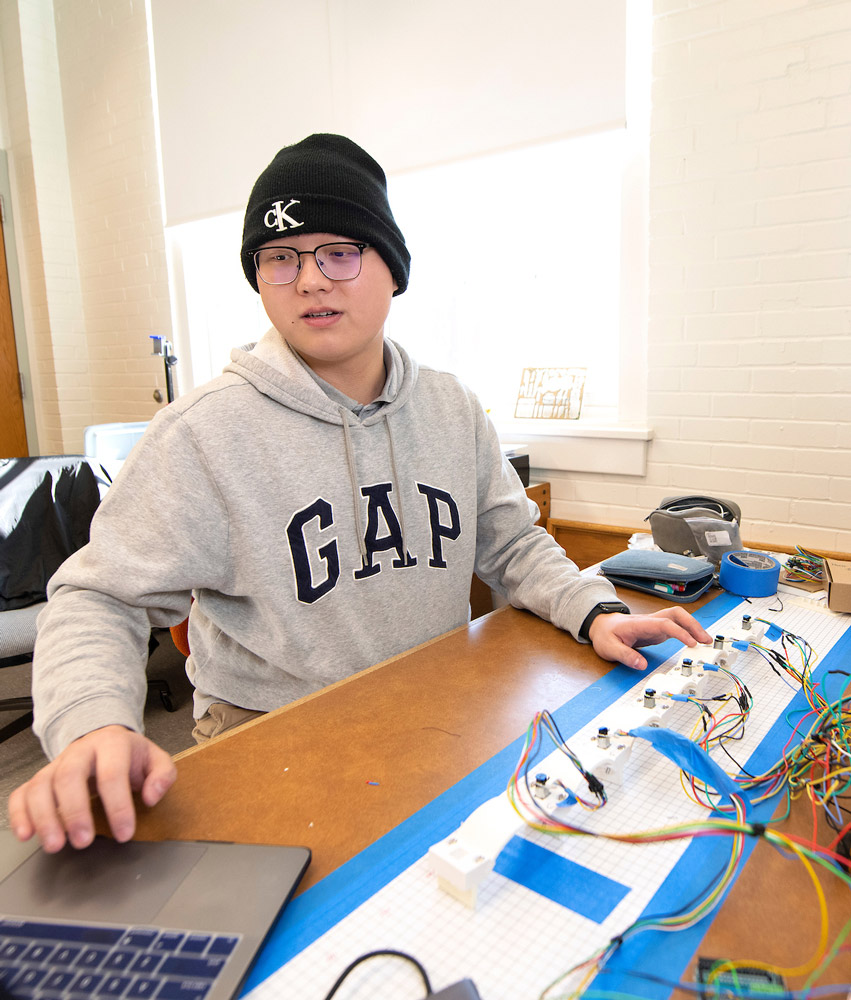

Features
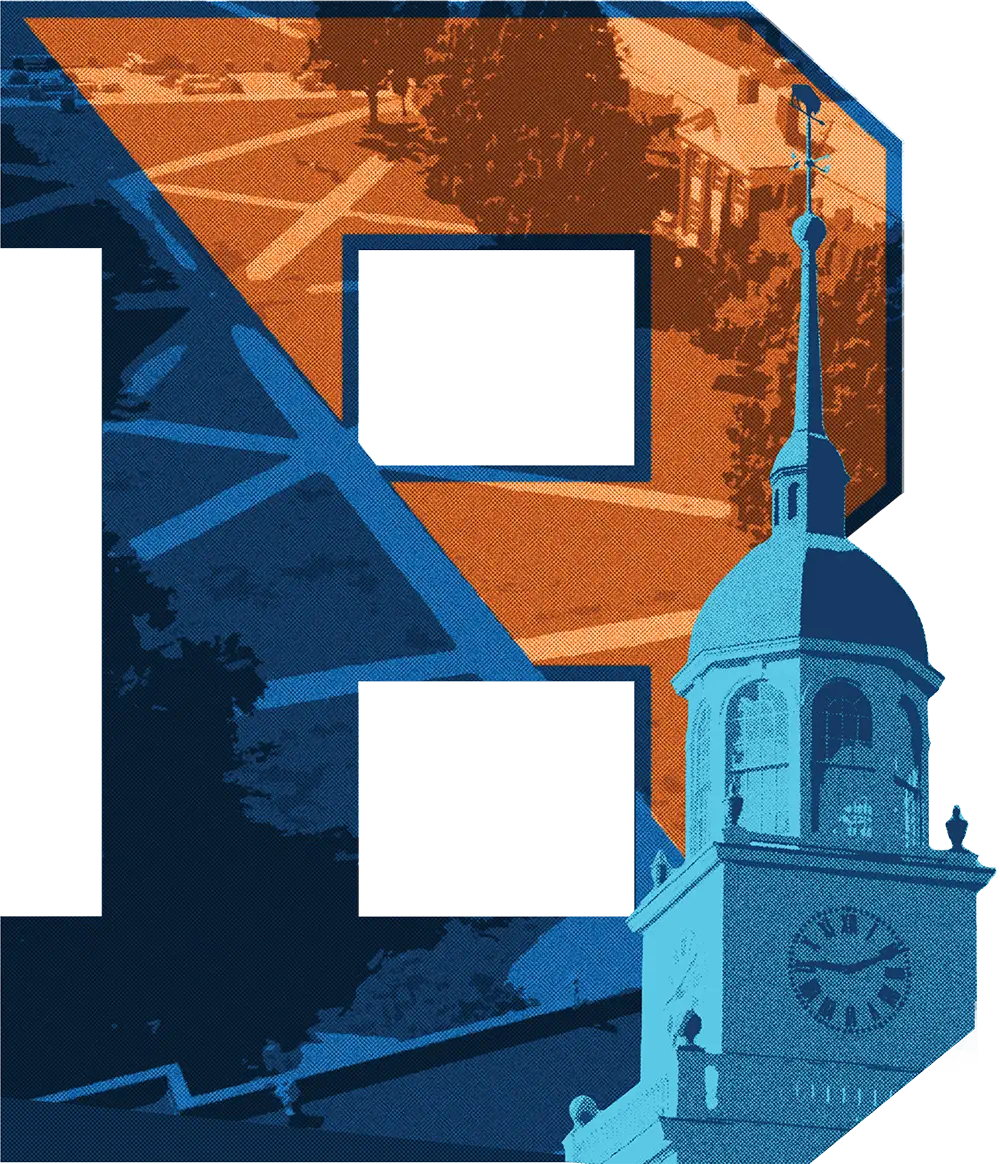
Creating an Inclusive, Equitable Community
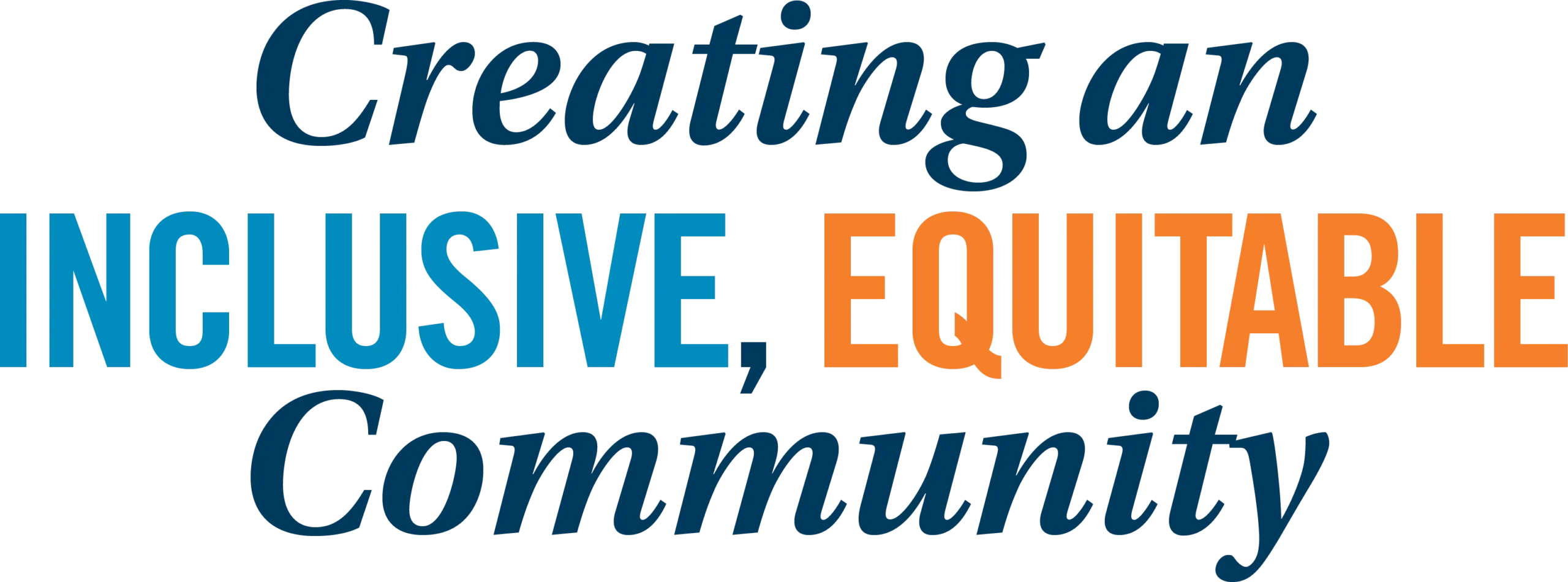
What’s happening?
The Supreme Court’s decision overrules legal precedent that allows admissions offices to consider the race of qualified applicants as one factor in their work to create a diverse learning environment for the benefit of all students. The ruling prohibits affirmative action in university admissions and disregards the educational benefits of a diverse student body and the societal benefits of ensuring graduates are effectively prepared to make meaningful contributions in the world.
“Bucknell’s commitment to diversity and equity is essential to our educational excellence, and will not waver with this ruling,” says President John Bravman. “As educators, we have an obligation to ensure that our graduates are equipped to succeed in life, personally and professionally. To thrive in a diverse society, they have to seek and respect perspectives and experiences of others. If we fail to create and nurture a campus community that celebrates our differences, we will not only fail our students — we will also jeopardize Bucknell’s future as a leader in higher education.”
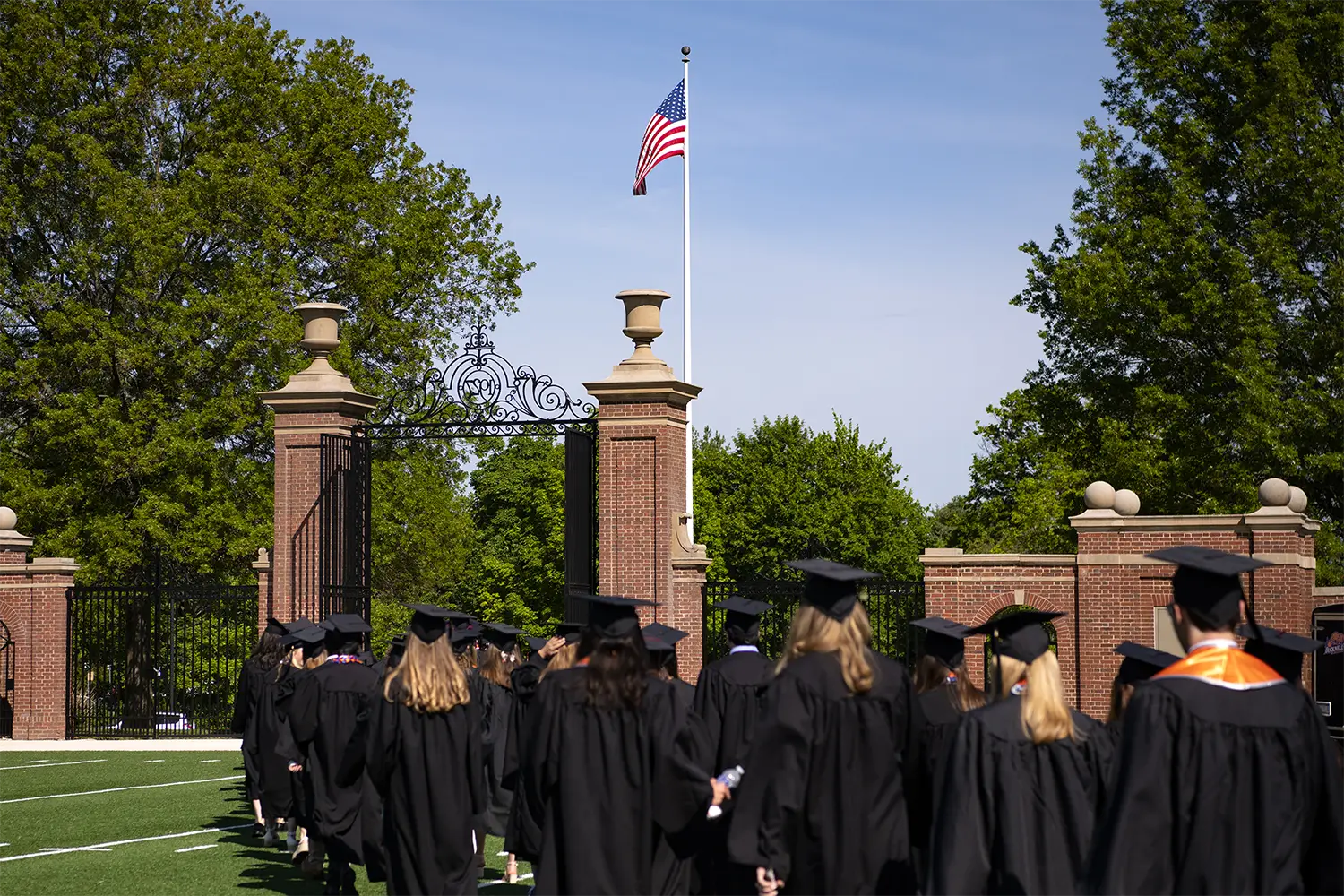

Onward

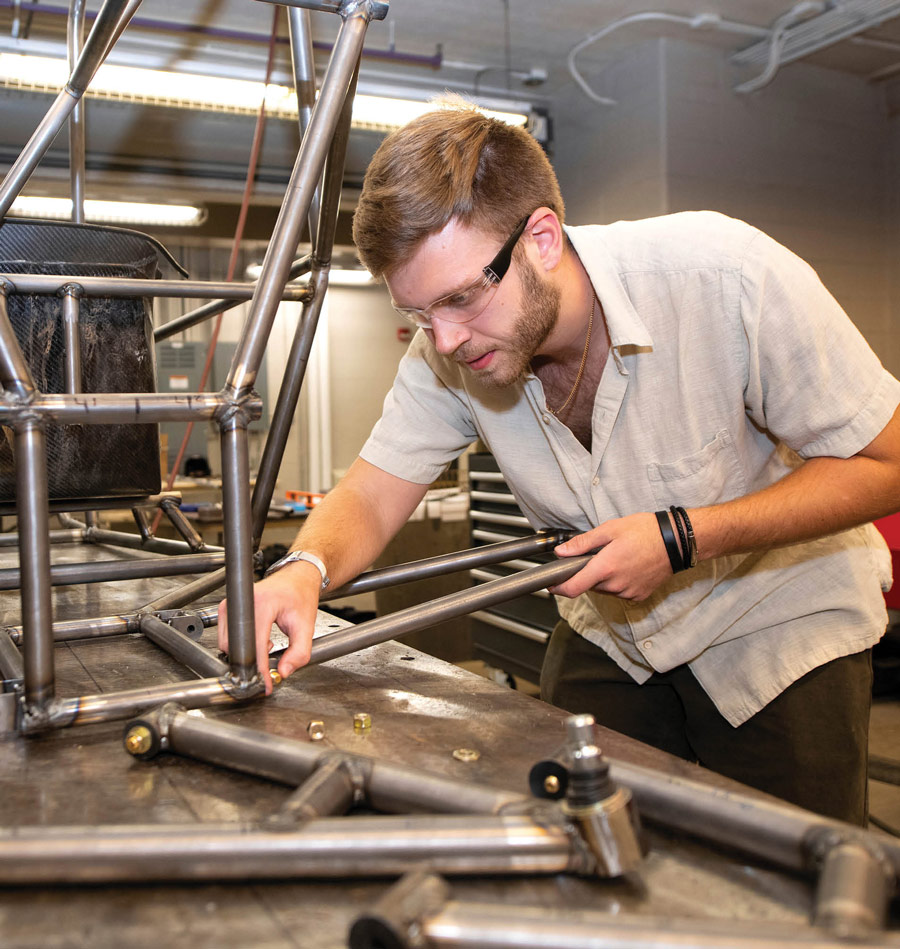


Driving Innovation
Elliot Thorp ’23, mechanical engineering
Next step > Body design engineer for Toyota
I feel extremely fortunate to start my journey at Toyota, a company that is focused on creating safe cars using sustainable engineering principles. In my role, I’ll be designing features such as body panels, seats, lights and airbags for newly manufactured vehicles and also building prototypes and testing the safety of new vehicle components.
The design experiences I acquired at Bucknell prepared me well. I spent two semesters designing sheet metal body shields for Professor Craig Beal ’08’s [mechanical engineering] electric vehicle research project. For my senior design project, I competed in Baja SAE, an undergraduate design challenge in which teams design and manufacture an off-road vehicle that they then race in a multiday competition. My role entailed designing, optimizing, manufacturing and testing the vehicle’s rear suspension system. Overseeing a project from start to finish and working as part of a team was extremely valuable and enhanced my educational experience.
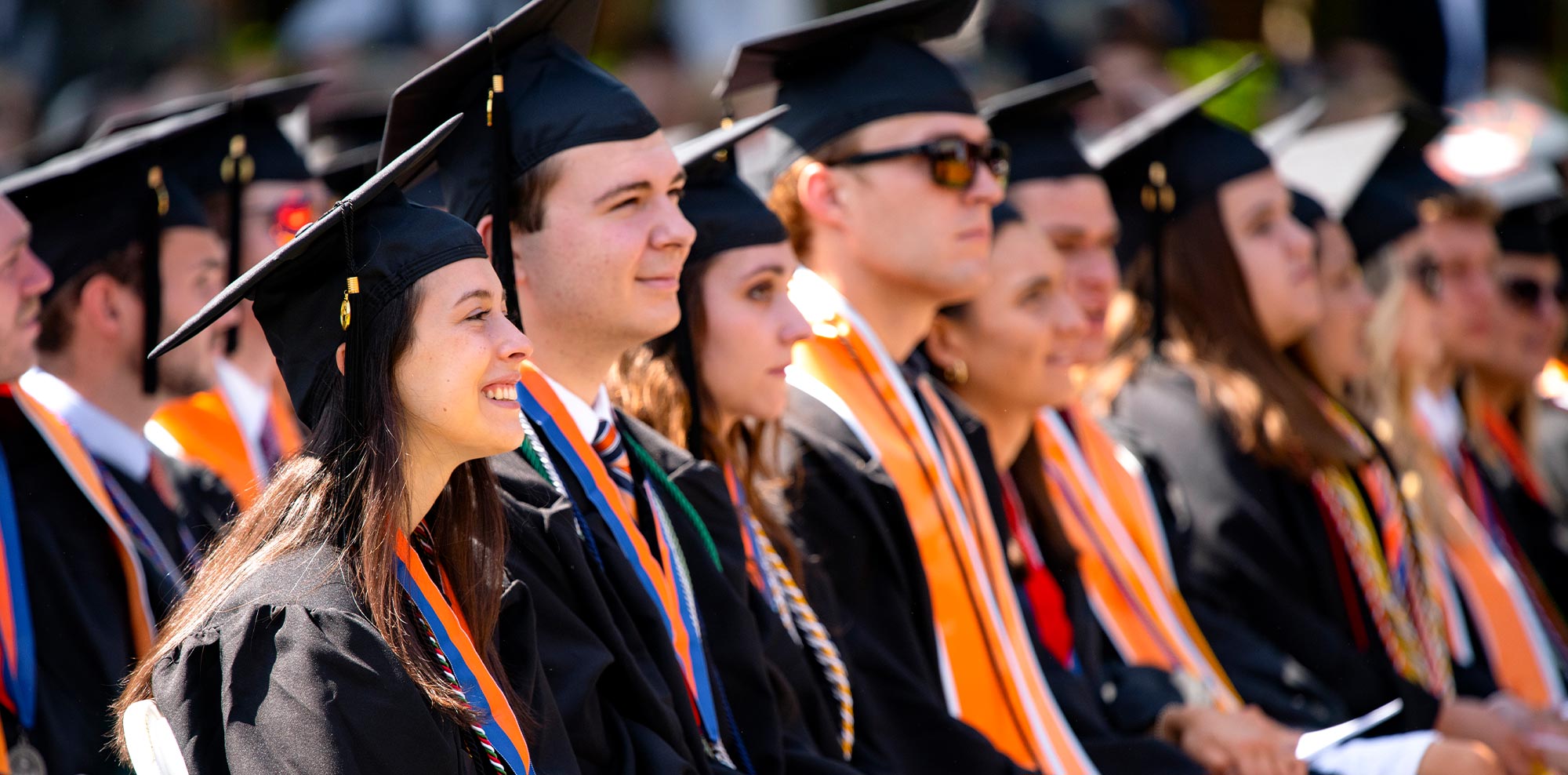
Welcome to the Herd

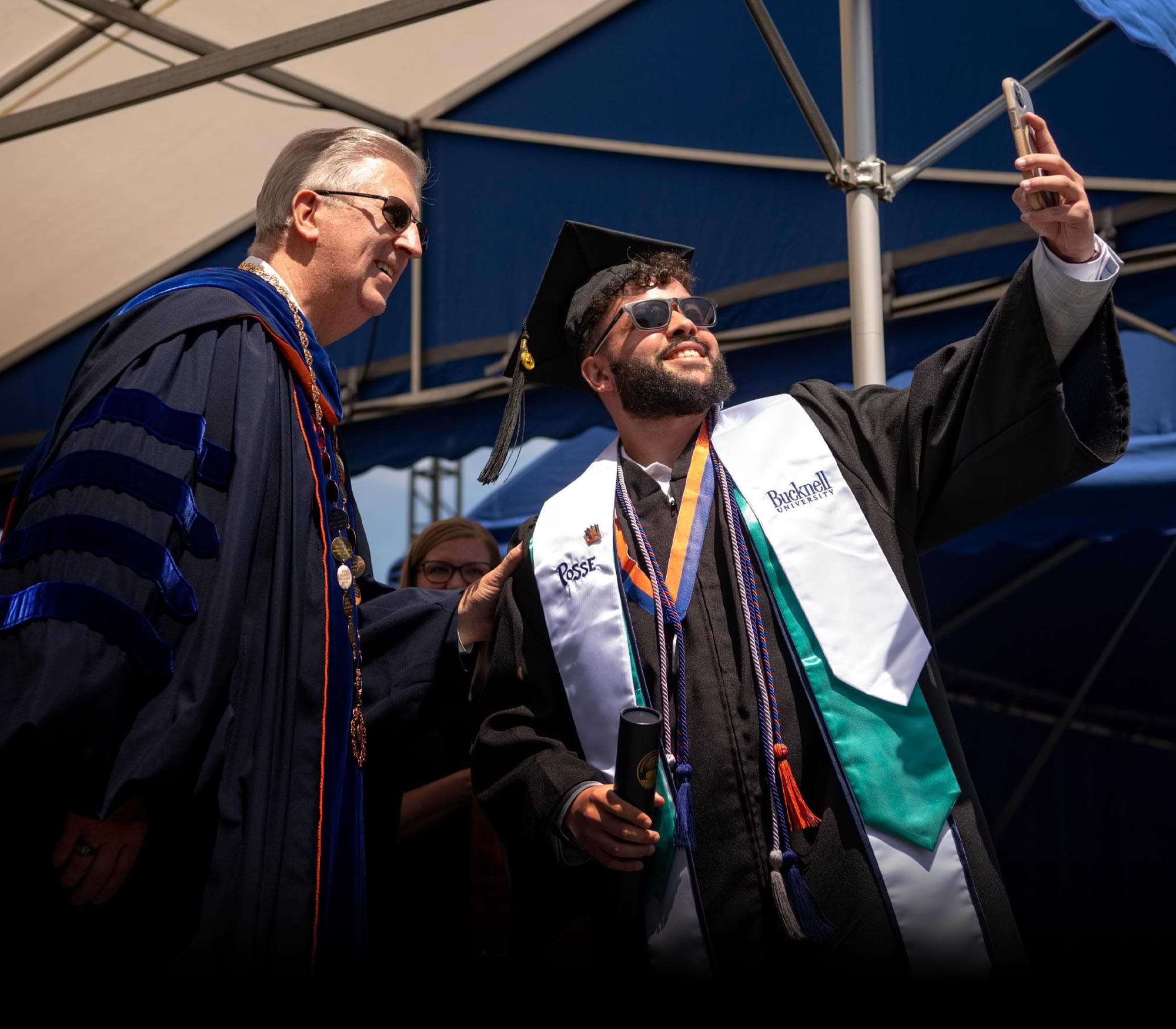
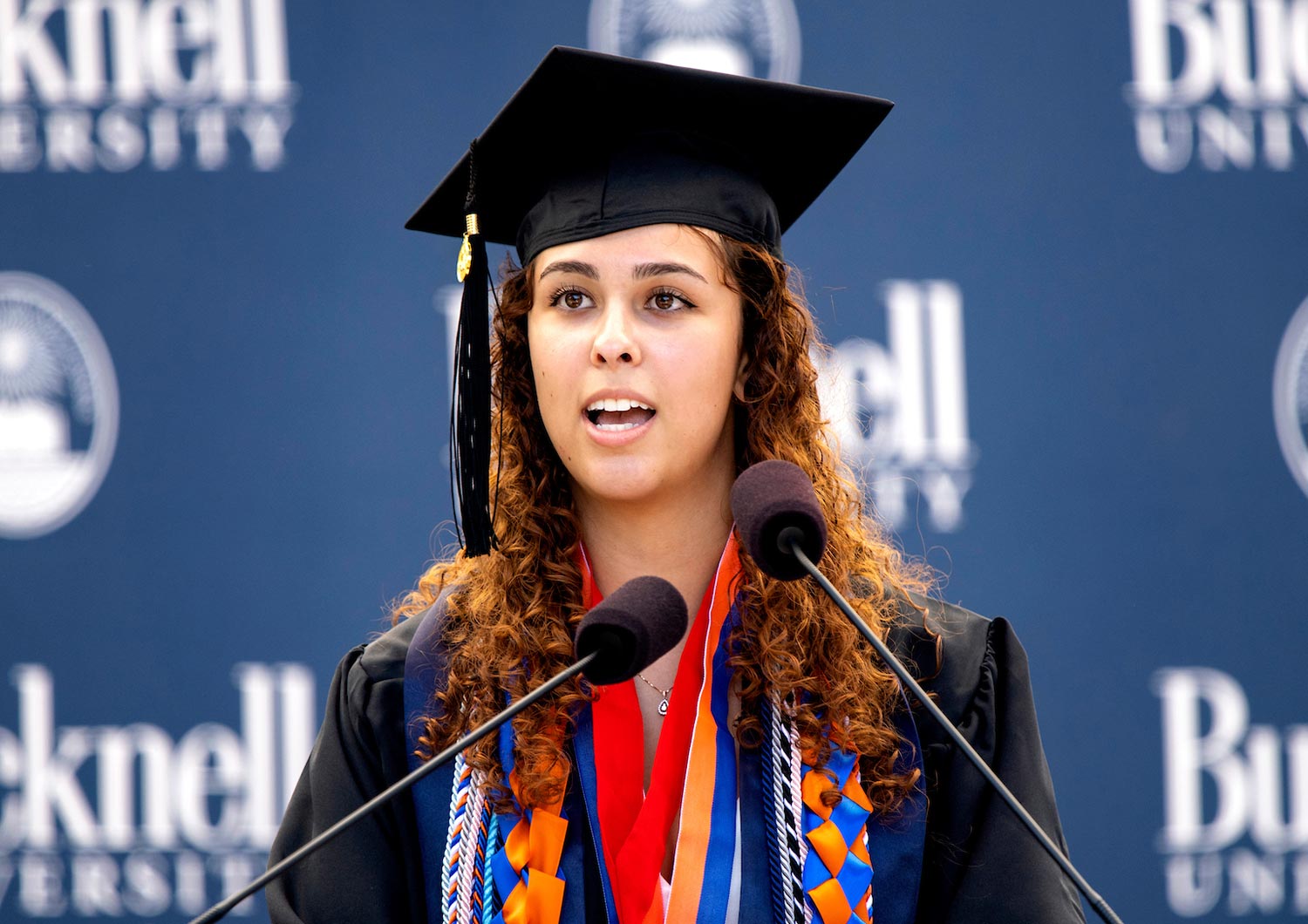

Kaia Rendo ’23, an English — creative writing, political science and Spanish triple-major from Elmwood Park, N.J., was selected as the Class of 2023’s student speaker.
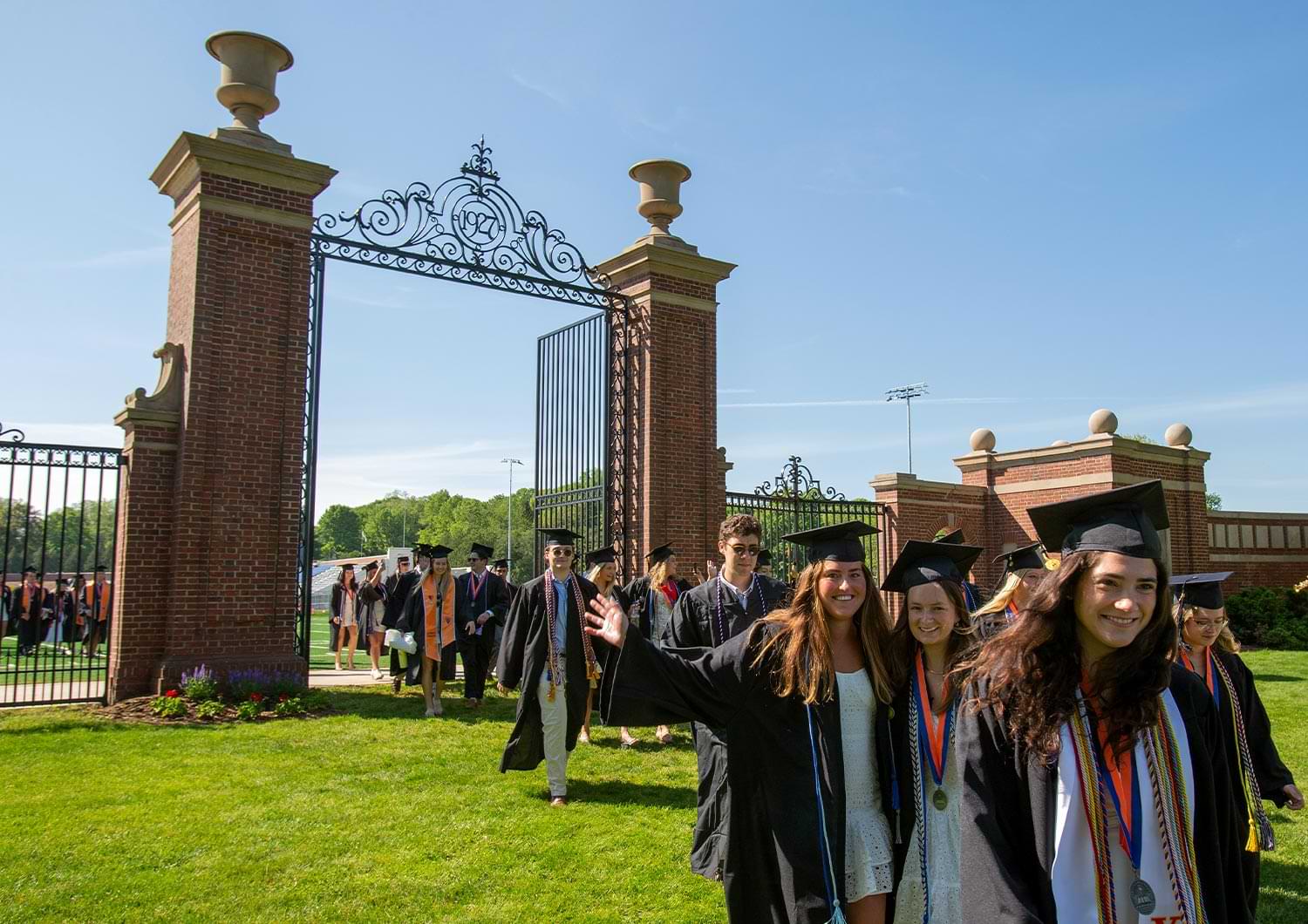

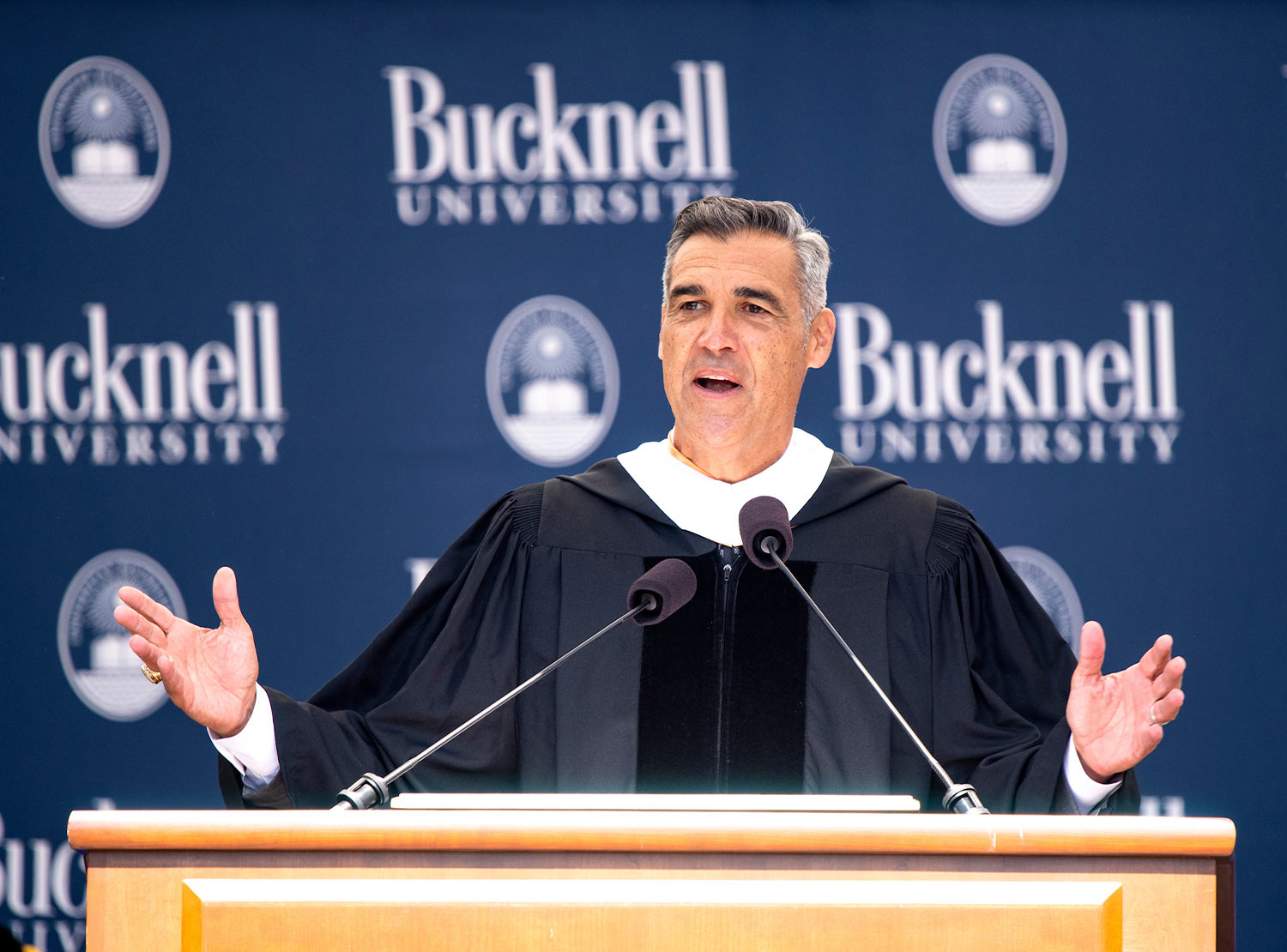

Commencement keynote speaker and legendary coach Jay Wright ’83 encouraged grads to work hard and bring a positive attitude to all that they do.
‘You Make Me Proud to Be a Bucknell Bison’
His holistic Bucknell experience informed the four-point coaching philosophy that has defined his career: “Hard: Work hard every day, bring enthusiasm and your best effort in everything you do. Together: Live your life for others. Be kind and selfless. Smart: Be a lifetime learner. Never stop growing. Always be open to new ideas. Pride: Take pride in being part of something bigger than yourself rather than focusing on personal glory.”
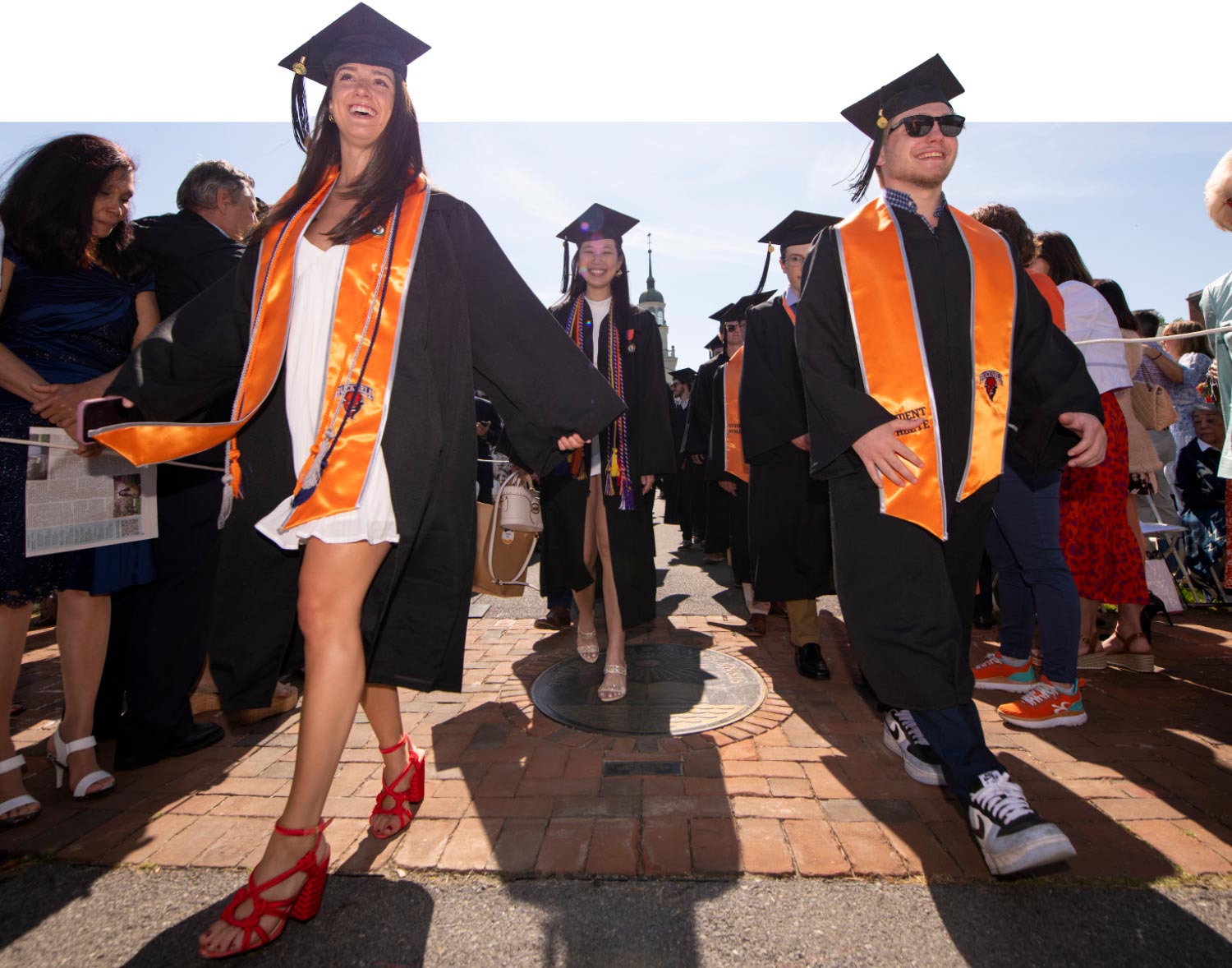
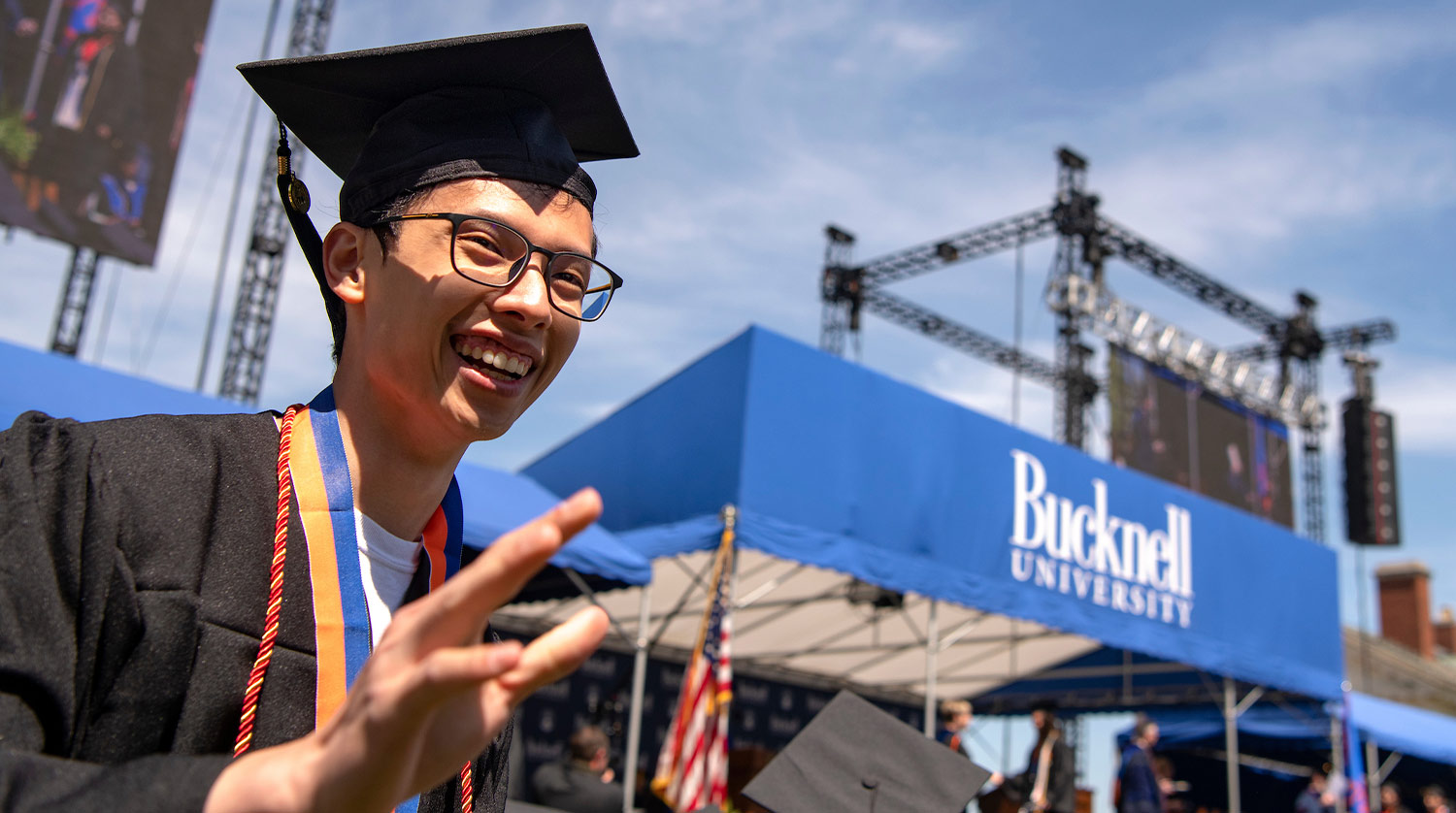
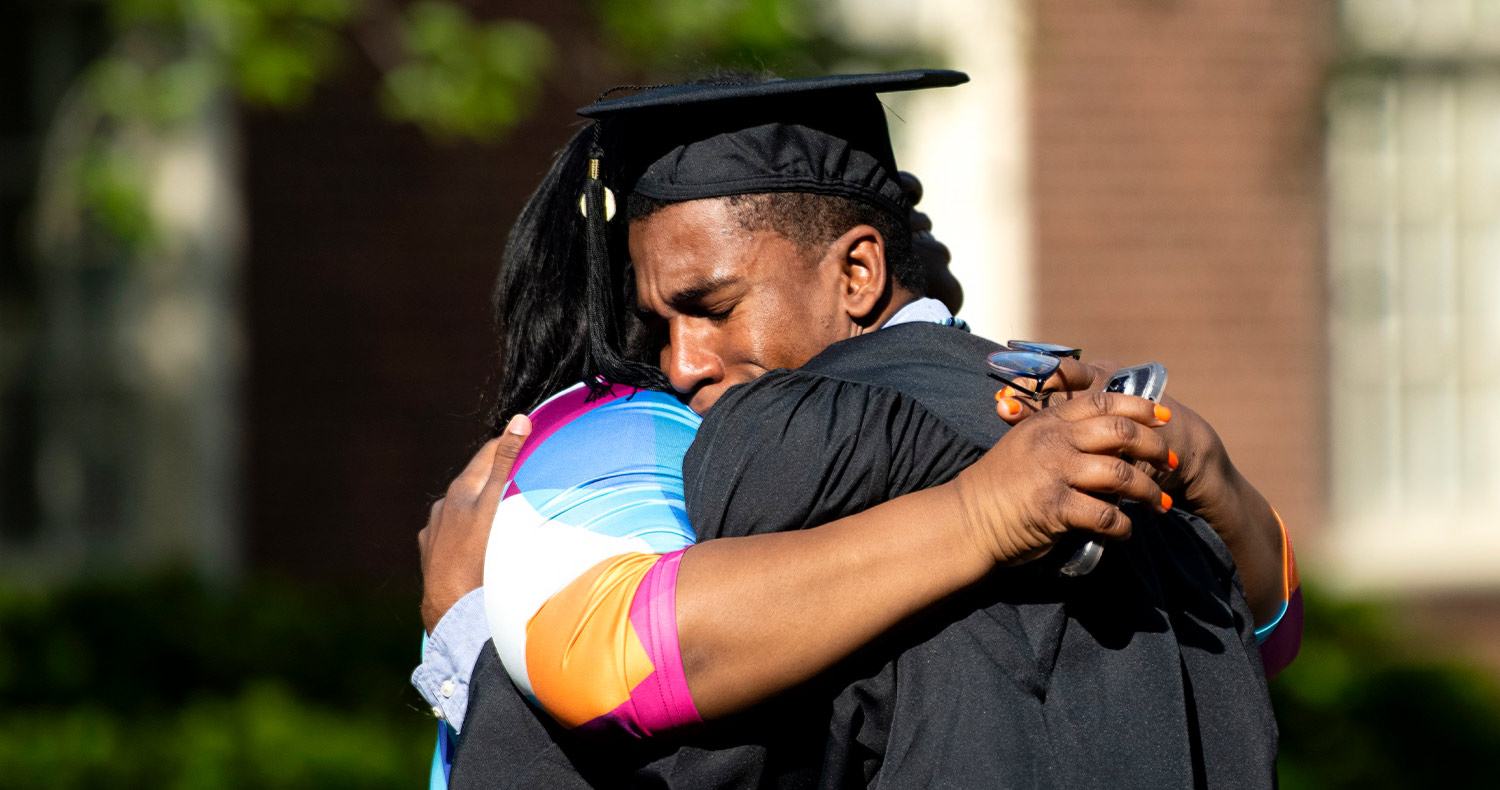
Tour de Force

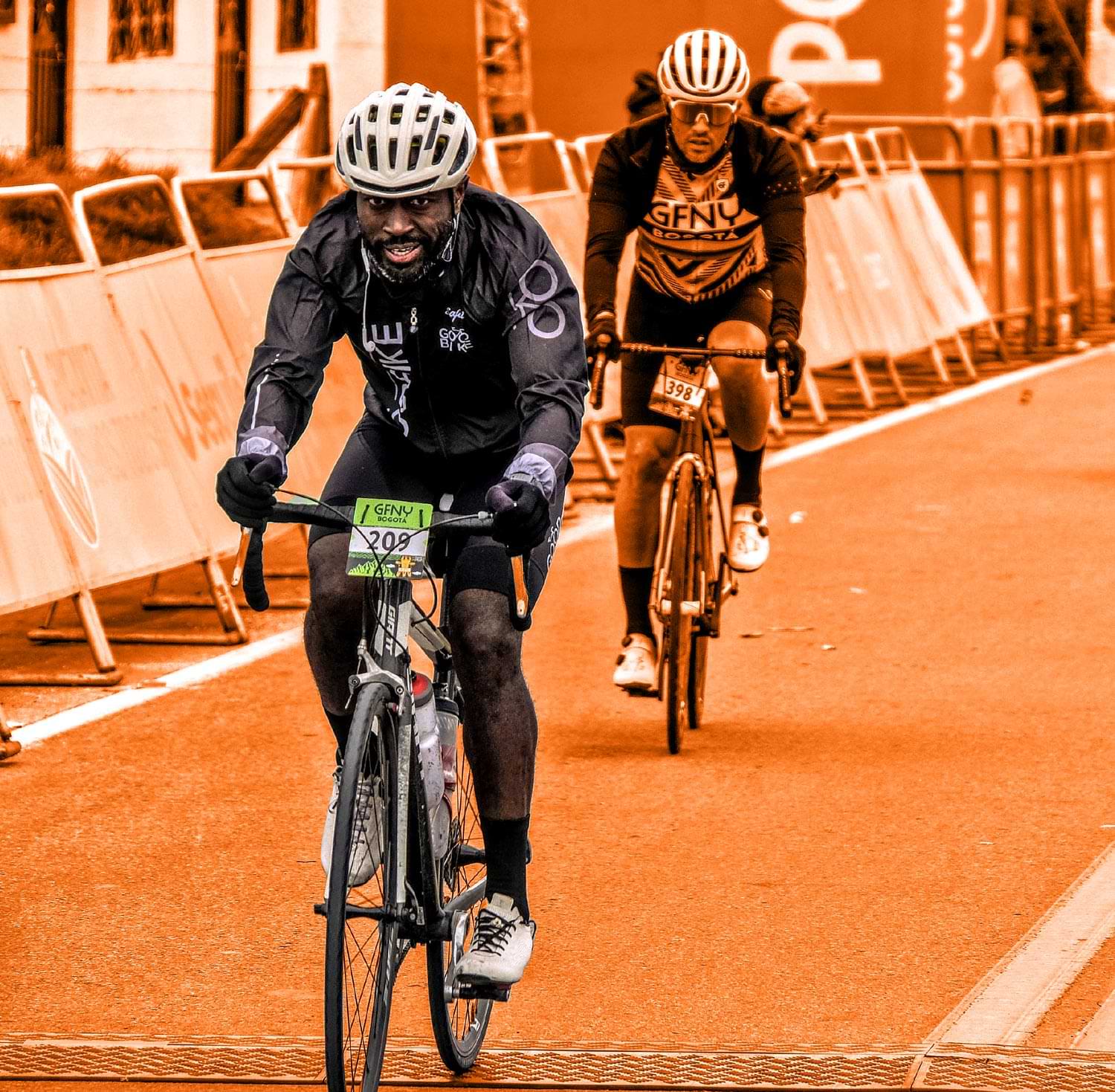
Muyambi Muyambi ’12 is tackling the most famous cycling route in the world — and he’s doing it to forward a mission he started at Bucknell
by Michelle Hamilton
photo courtesy of GFNY Bogotá
 n July — as this magazine was heading to press — Muyambi Muyambi ’12 was pushing the limits of his physical strength, mental fortitude and tolerance for pain. He was midway through one of the world’s most notoriously challenging endurance endeavors — something only the world’s fittest athletes ever attempt: cycling the Tour de France route.
n July — as this magazine was heading to press — Muyambi Muyambi ’12 was pushing the limits of his physical strength, mental fortitude and tolerance for pain. He was midway through one of the world’s most notoriously challenging endurance endeavors — something only the world’s fittest athletes ever attempt: cycling the Tour de France route.
On July 2, Muyambi set off on his quest to finish the 2,115-mile, 21-day stage event by trailing the elite racers by one day. While he’s not an official competitor, he is covering the exact race course — which means pedaling 100-plus miles a day, over grueling mountainous terrain, in sweltering heat for three weeks. It’s an extreme test of athleticism that demands equal parts physicality and tenacity.
Muyambi’s ambition is rooted in his long-standing commitment to Cycle Connect, a nonprofit he founded in 2012 as a student at Bucknell. What started as a club — initially called Bicycles Against Poverty — has evolved into a full-fledged organization (thanks to Bucknellian support, see “Bucknell Roots,”) that has provided thousands of bikes to Ugandan farmers so they can transport their products to market and earn an income.
Muyambi Muyambi ’12 is tackling the most famous cycling route in the world — and he’s doing it to forward a mission he started at Bucknell
by Michelle Hamilton
photo courtesy of GFNY Bogotá
 n July — as this magazine was heading to press — Muyambi Muyambi ’12 was pushing the limits of his physical strength, mental fortitude and tolerance for pain. He was midway through one of the world’s most notoriously challenging endurance endeavors — something only the world’s fittest athletes ever attempt: cycling the Tour de France route.
n July — as this magazine was heading to press — Muyambi Muyambi ’12 was pushing the limits of his physical strength, mental fortitude and tolerance for pain. He was midway through one of the world’s most notoriously challenging endurance endeavors — something only the world’s fittest athletes ever attempt: cycling the Tour de France route.
On July 2, Muyambi set off on his quest to finish the 2,115-mile, 21-day stage event by trailing the elite racers by one day. While he’s not an official competitor, he is covering the exact race course — which means pedaling 100-plus miles a day, over grueling mountainous terrain, in sweltering heat for three weeks. It’s an extreme test of athleticism that demands equal parts physicality and tenacity.
Muyambi’s ambition is rooted in his long-standing commitment to Cycle Connect, a nonprofit he founded in 2012 as a student at Bucknell. What started as a club — initially called Bicycles Against Poverty — has evolved into a full-fledged organization (thanks to Bucknellian support, see “Bucknell Roots,”) that has provided thousands of bikes to Ugandan farmers so they can transport their products to market and earn an income.
'ray Bucknell
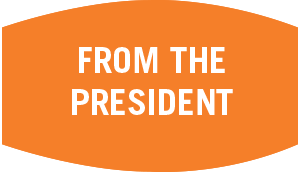
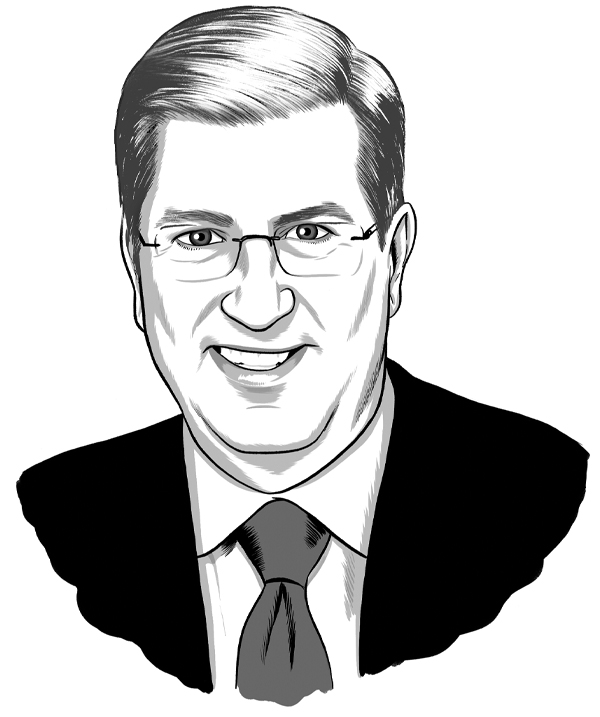
Our Commitment to Equitable Access and Outcomes
First, we as educators are obligated to prepare our students to move fluidly and confidently in a global society. Our students are on campus for only a few years, but they are citizens of their communities forever — communities that are filled with people with vastly different experiences, abilities and identities. As the spouse of someone with a permanent physical disability, I have seen firsthand how community can work well in the face of difference, and what the effects are when it does not.
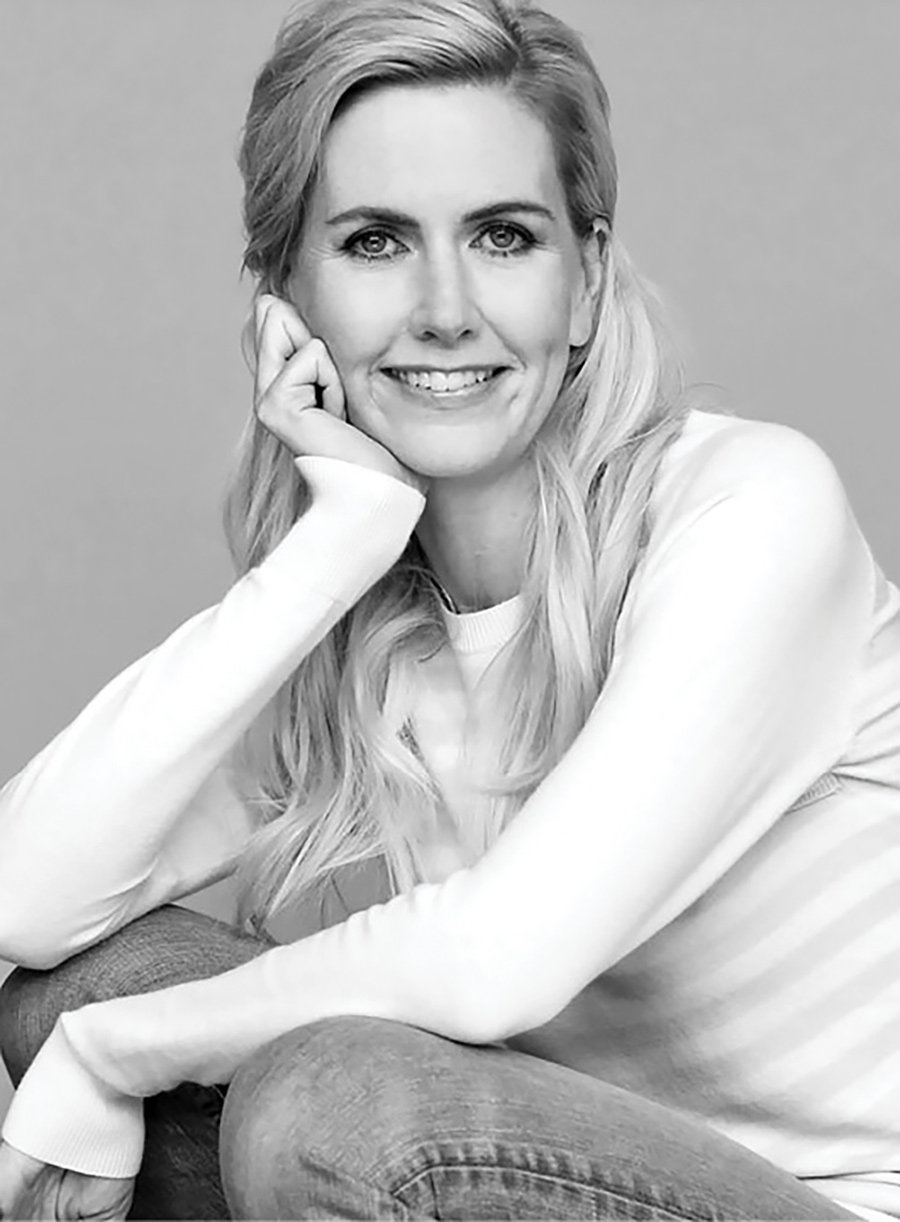
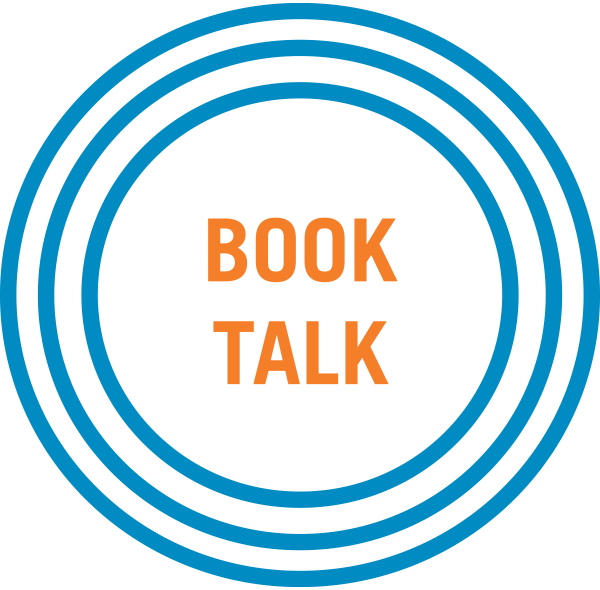
Forced to Shift
Debuting in May 2023, Staggs’ first novel, Uncontrollable, draws upon her journey from civil litigator to published writer — an unexpected transition resulting from her living with epilepsy. She describes the book as being in the “own voices” movement: a term coined to identify when a story’s protagonist and the author share a marginalized identity.
“Epilepsy is so underrepresented in the media and literature and also very dangerously misrepresented whenever it is talked about,” says Staggs. “Yet it’s the fourth most common neurological condition in the United States. This book gives an accurate view, through fiction, and brings epilepsy into the light.”
PROFILE
Brain Power
“Organic chemistry presented a beautiful logic,” he says. “Psychology revealed that everything uniquely human — from language to art to music to consciousness — emerges from a brain that follows chemical rules. My career has bridged those two courses from that first semester.”
Today, Walsh is a celebrated neuroscientist who studies the genes that influence the cerebral cortex, the part of the brain responsible for functions such as memory, reasoning, personality traits and language. He serves as the chief of genetics and genomics and director of the Allen Discovery Center for Human Brain Evolution at Boston Children’s Hospital. Over the course of his career, he has identified 35 neurological disease genes. In 2022, he was awarded the Kavli Prize in Neuroscience for his work uncovering genetic mutations that can cause epilepsy and autism spectrum disorders.
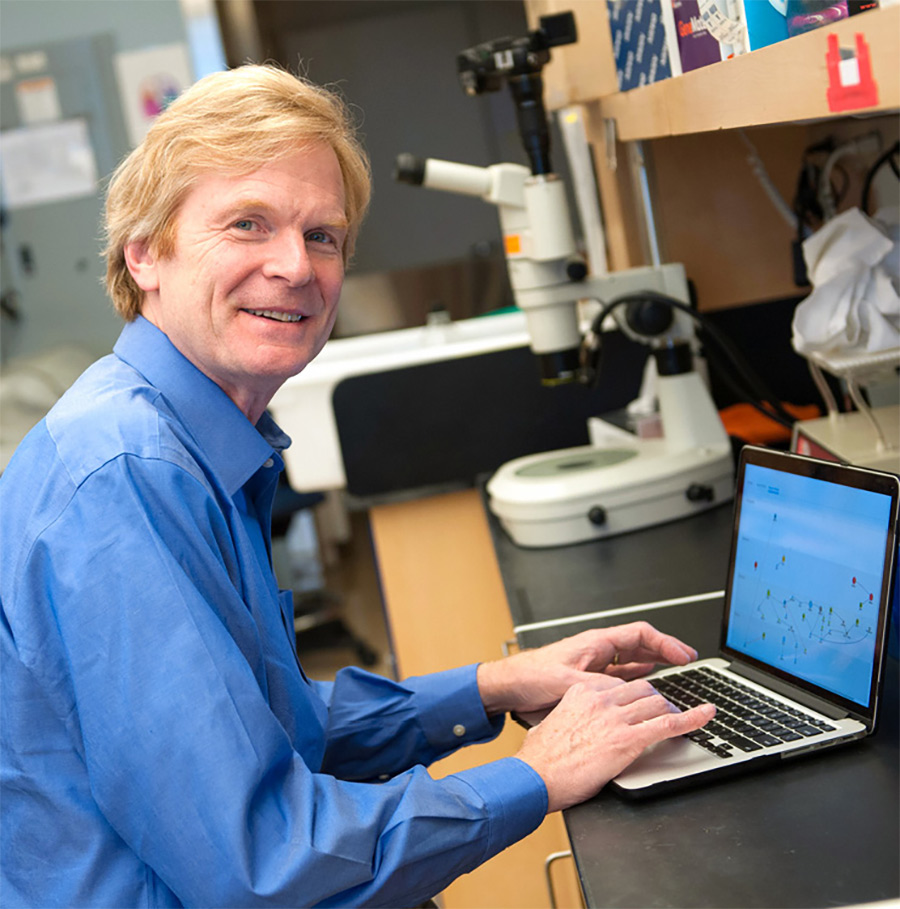

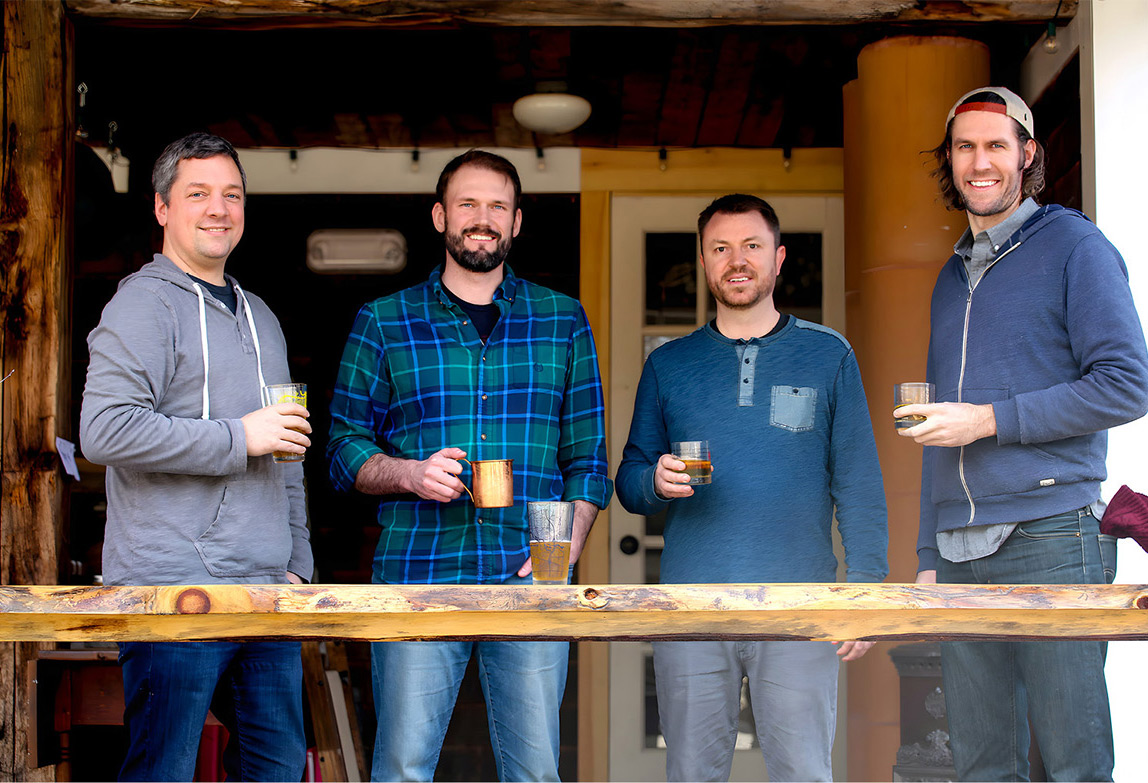
A Gifted Group
In 2009, Brian Johnson ’02 was working as a mechanical engineer for the Army when he started a side hustle creating home goods, such as picture frames and DVD holders, out of recycled materials. By 2012, Johnson, who originally called the company Uncommon Green, had developed a line of engraved city map barware. His idea was to illustrate a personal connection to a place or experience, using a functional, everyday item as a canvas.
PROFILE
HR Star
Dawn Kleinman Klinghoffer ’91 leads that effort at Microsoft. As vice president of human resources business insights, Klinghoffer oversees a global team that compiles and studies “people analytics.” Using a detailed biannual employee survey and other employee listening tools, they collect data to help the company’s leadership improve the employee experience and support HR priorities such as global diversity and inclusion, talent management, and learning and development.
Under Klinghoffer’s leadership, Microsoft switched its focus from employee engagement to employee thriving — an intentional shift that focuses on building meaningful relationships between managers and employees to boost employee energy and prevent burnout. “Our goal is to help our human resources leaders use data to make better decisions,” she says. “We do that while retaining the ‘human’ element of HR by ensuring the data has context behind it. In this way, we bring art and science together to make the best holistic decisions for our employees.”
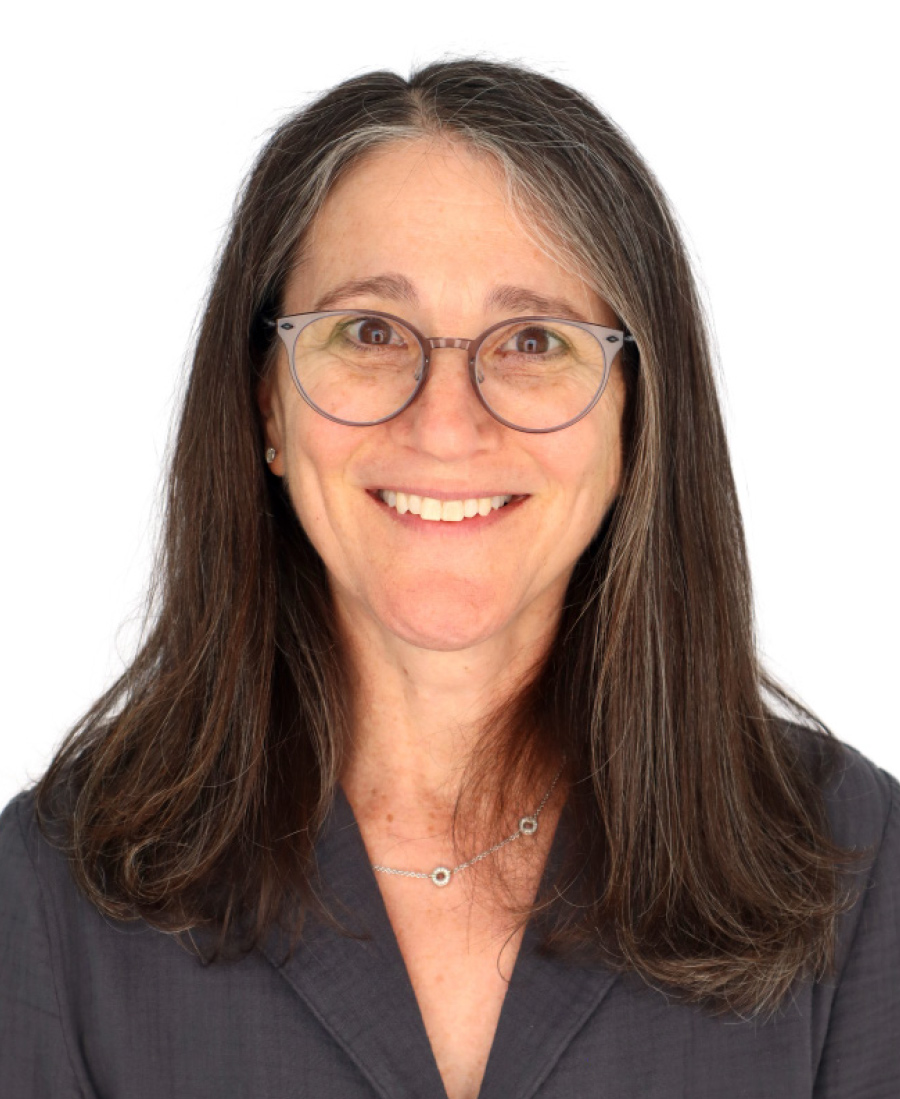
PROFILE
From Passion to Action
JESSICA SCOTT ’08, doesn’t do anything halfway. In addition to working as senior climate adviser in the Maine Governor’s Office of Policy Innovation and the Future, she’s also spending her summer moonlighting as a crew member aboard a historic schooner to get a crash course in sailing. “It feels appropriate,” says Scott, a New Hampshire native who moved to Maine two years ago. “Everyone here is a boat person or is boat-adjacent. I thought I should embrace the cultural history of this place.”
Scott’s intensity is fueled by a work ethic and an interest in leaving things better than she found them. While studying animal behavior at Bucknell, Scott began pulling strings on her career in environmental policy. She helped establish the Bucknell Center for Sustainability & the Environment and was responsible for getting solar panels installed on the building that houses the center. She was also key in orchestrating a daylong teach-in on climate change.
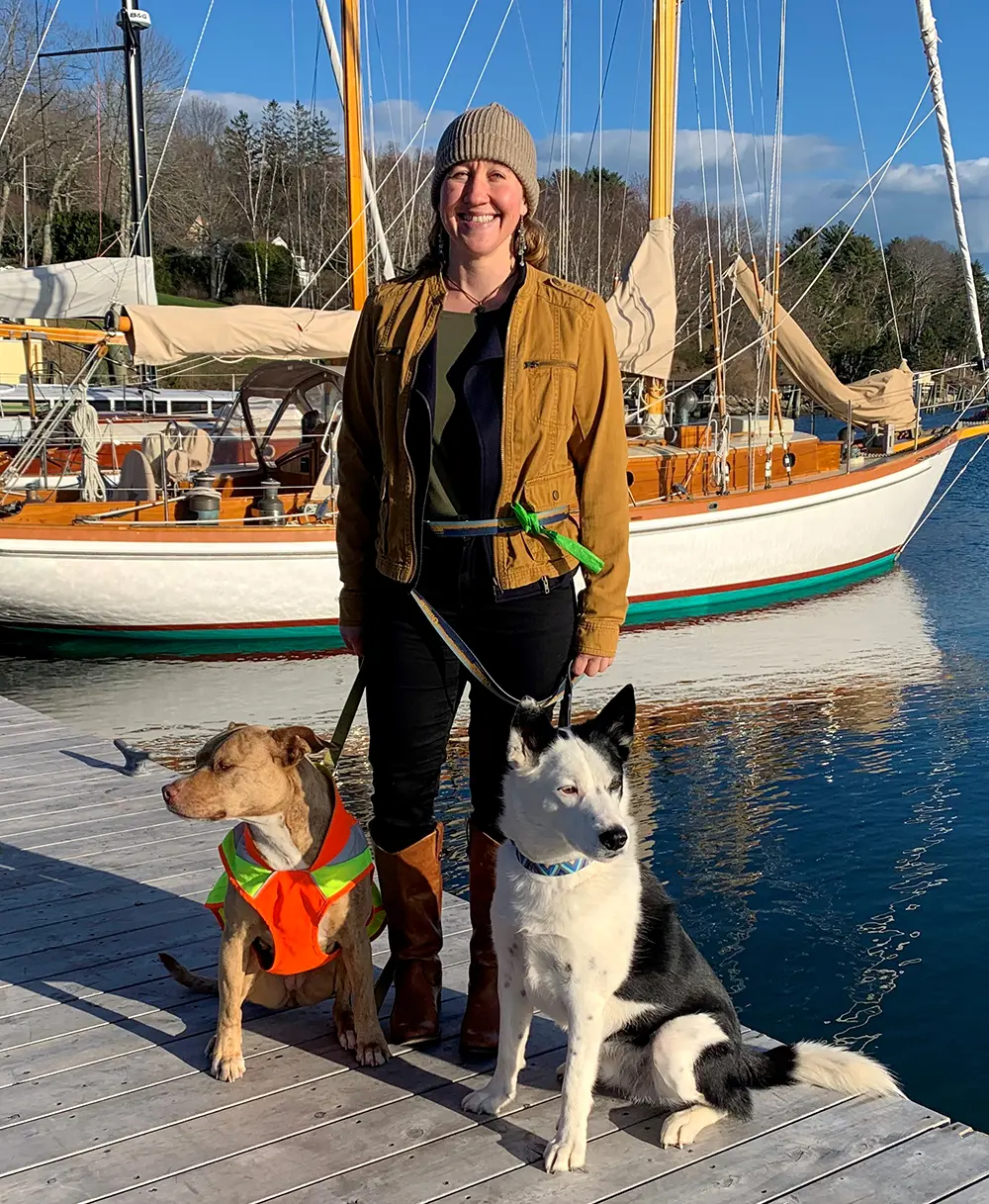
PROFILE
Value Added
Greene works with homeless and at-risk children and young adults at Valley Youth House, a social services organization that offers emergency shelter, counseling and mentoring at 300 residential sites across Pennsylvania. In his role as director of quality, Greene ensures the myriad of programs across all levels of care meet the organization’s goals, and looks for opportunities for continuous improvement.
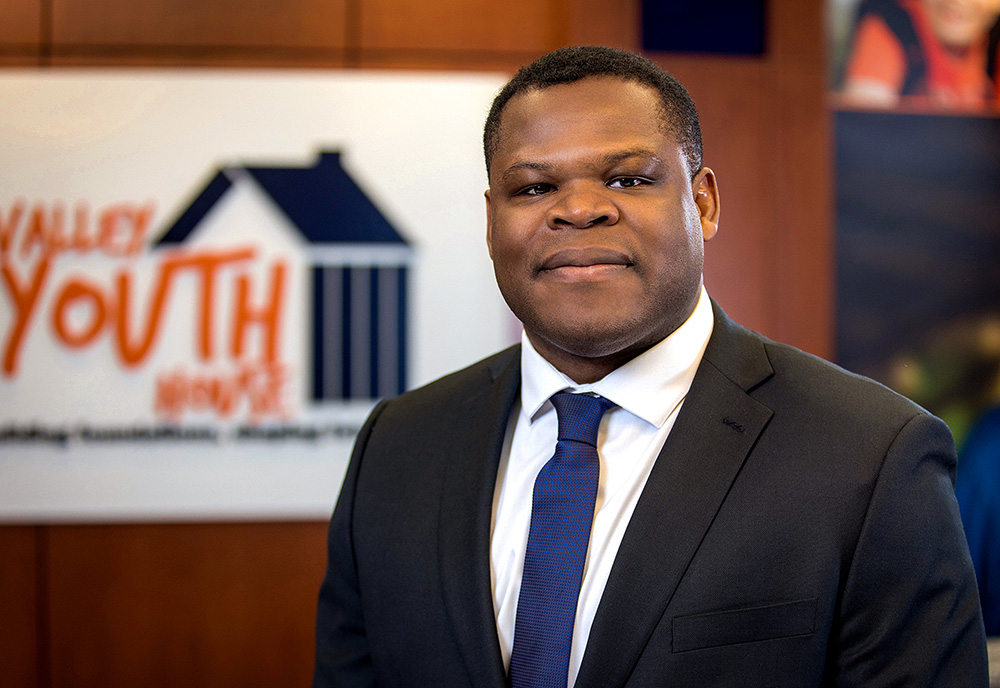
IN MEMORIAM
1942
1945
1947
Jeanne Stern Manning, April 13, Westwood, Mass.
Joyce Hauck Martin, April 3, Gastonia, N.C.
Jeane Morgenthal Roberts P’74, Dec. 18, Southbury, Conn.
Jesse Syme P’77, G’11, G’15, Jan. 26, Pasadena, Calif.
1948
Florence “Kandy” Kreitler Davis, April 3, Blacksburg, Va.
Trudy Vogel Graham G’21, G’24, Jan. 18, Tucson, Ariz.
Dorothy Seesholtz Mullestein, March 30, Kennett Square, Pa.
Douglas Candland
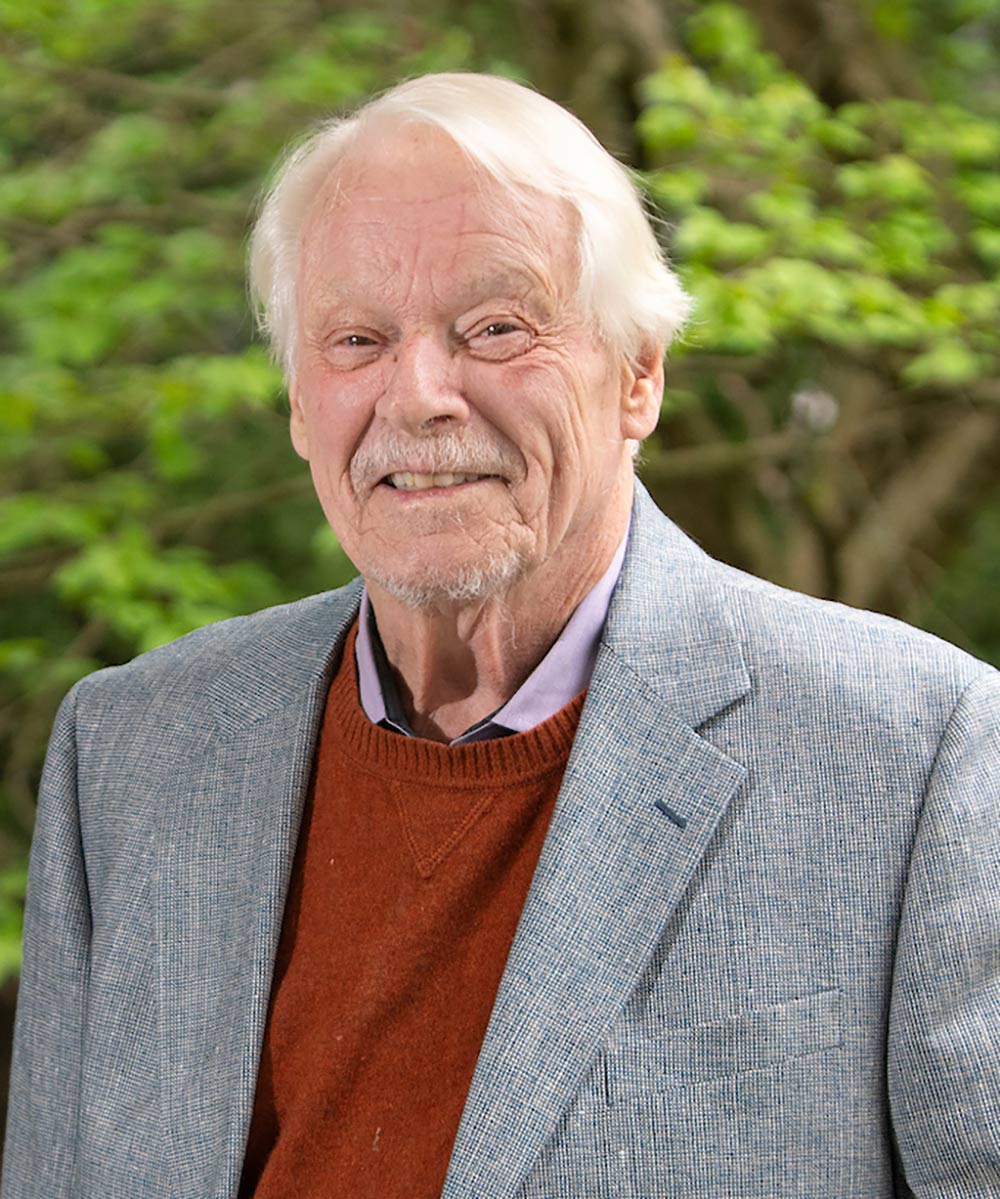
Photo: Emily Paine
Candland was instrumental in establishing the animal behavior program and laboratories at Bucknell, which provided many generations of students the opportunity to study primate behavior. Housing groups of rare and sometimes threatened species allowed students to observe behavior that had not been previously documented.
Throughout his career, Candland published approximately 100 research papers, many of which included student collaborators as co-authors. His legacy as a teacher-scholar continues via the Douglas K. Candland Dean of the College of Arts & Sciences. The position was established by his former student Glen Tullman ’81.
Candland wrote several books, including Psychology: The Experimental Approach (1968), which served as a text for schools offering courses in experimental psychology. His book Feral Children and Clever Animals: Reflections on Human Nature (1993) found a broad audience outside academics and led to extensive media coverage. He appeared in documentary films and television segments produced by the BBC, National Geographic, Discovery Channel, ABC and CBS, among others, in which he shared his expertise on animal behavior, animal rights and the history of human interactions with animals.
Jim Schubauer ’56, P’81, G’12, G’15
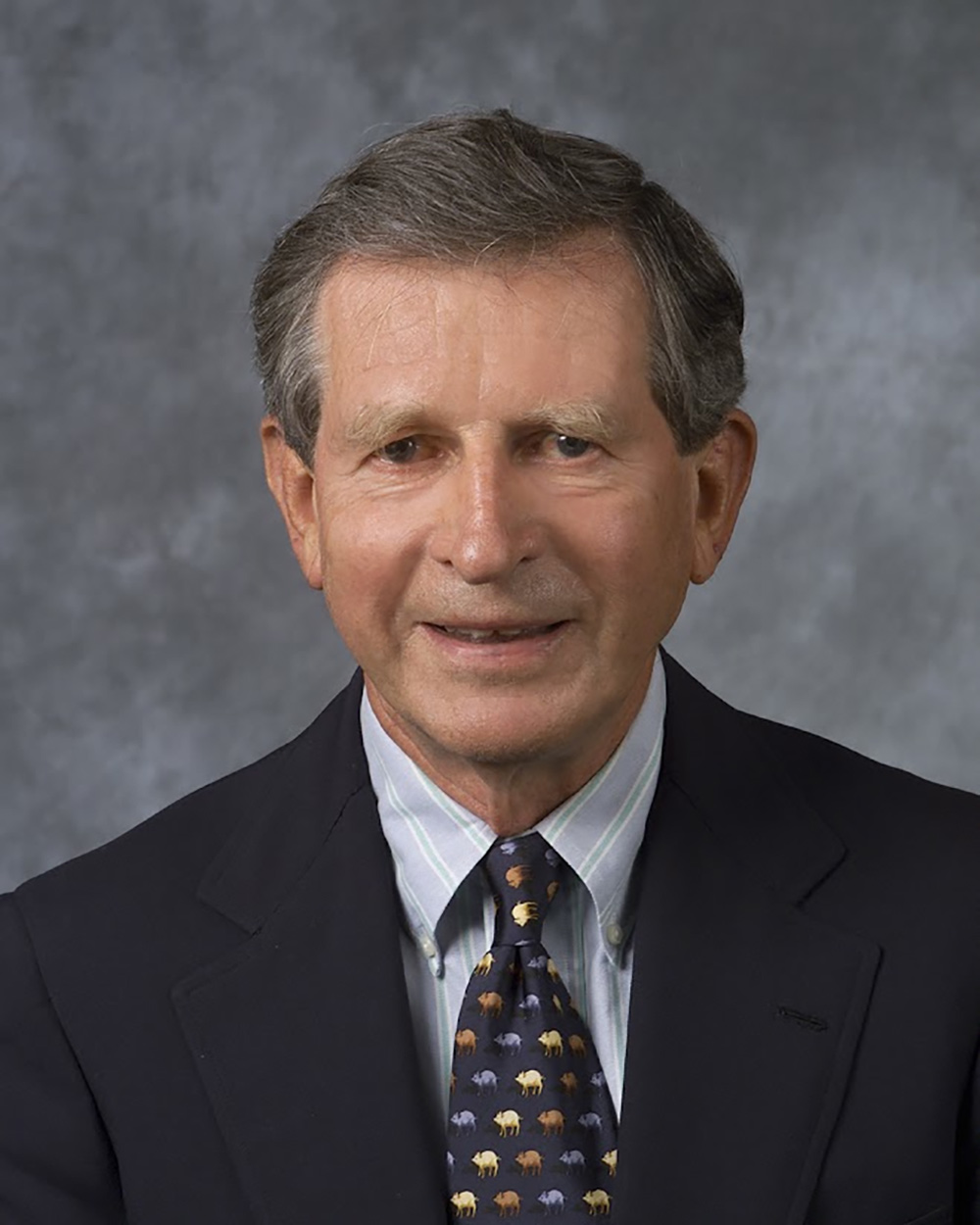
Photo: Courtesy of Special Collections/University Archives
As a student at Bucknell, Schubauer studied civil engineering and was active across campus. He participated in ROTC and the American Society of Civil Engineers, and he earned membership into Tau Beta Pi, the engineering honor society, and Pi Mu Epsilon, the mathematics honor society. Schubauer was also a member of the Theta Chi fraternity and contributed to L’Agenda, Bucknell’s yearbook.
After graduating, Schubauer began working as a project engineer for Stone & Webster Engineering Corporation in Boston. He then served as a first lieutenant in the Army Corps of Engineers Reserves. In 1959, Schubauer earned his MBA from the University of Michigan and moved to Long Island to join Schumacher & Forelle, a regional general contractor. He was named CEO in 1974. The company flourished under his leadership and became an international leader in the design and construction of corporate manufacturing facilities.
He retired in 1992 and turned his focus to volunteerism and philanthropy. Schubauer was elected to Buckell’s Board of Trustees in 1989 and served as chair of the board from 1996 to 2001, when he was elected chair emeritus. He also was a member of the Bucknell Engineering Alumni Association Board of Directors, the Engineering Centennial Lead Gifts Committee, the Sesquicentennial Campaign Regional Committee, and the campaign cabinet for The Bucknell Campaign. Schubauer and his wife, Barbara, established the Schubauer Family Scholarship in 2000.
DO
Connect with Classmates
Answer This:
FOLLOW US ON linkedin TO SUBMIT YOUR ANSWER.
Save the date
Read All About It
Update Your Information
Crowdsourced
What book changed your life?
Witty Winners
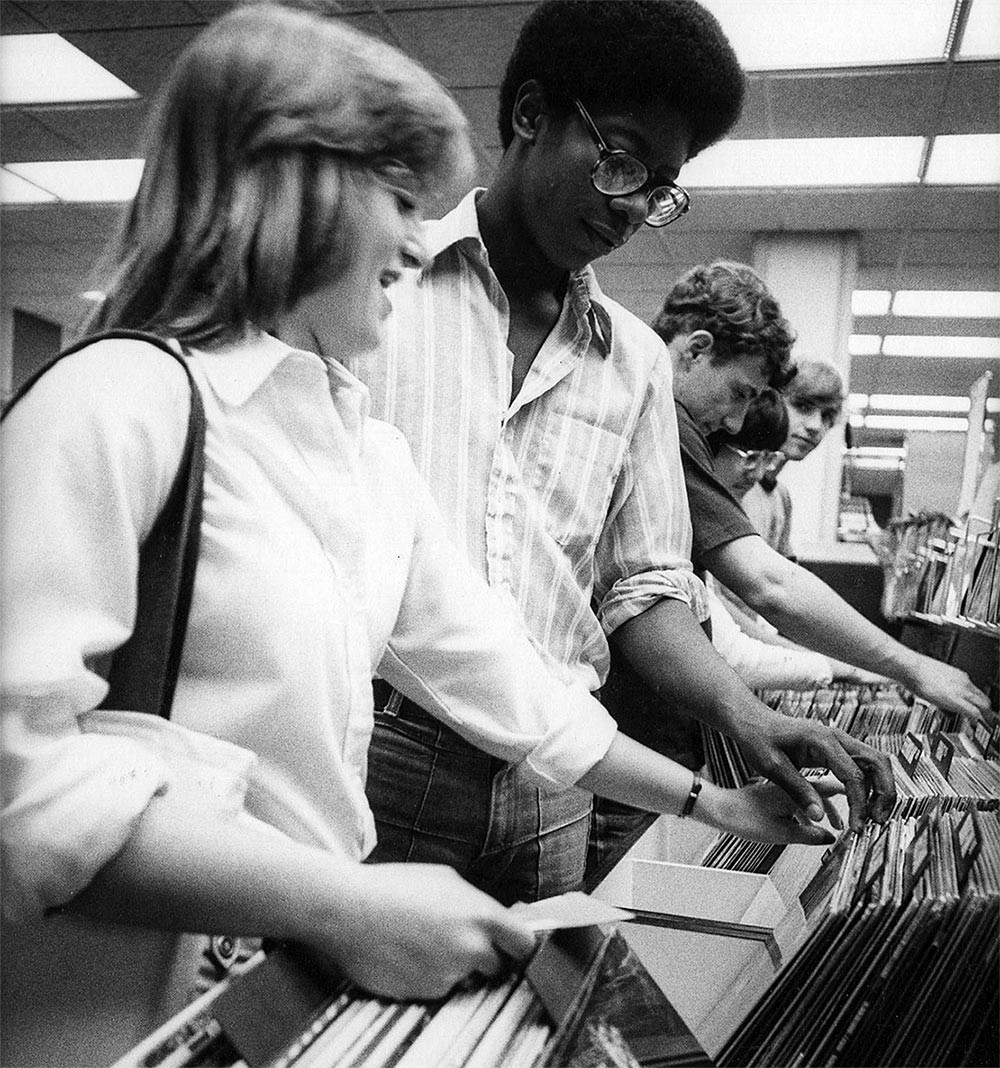
Alumni Honored for Remarkable Achievement
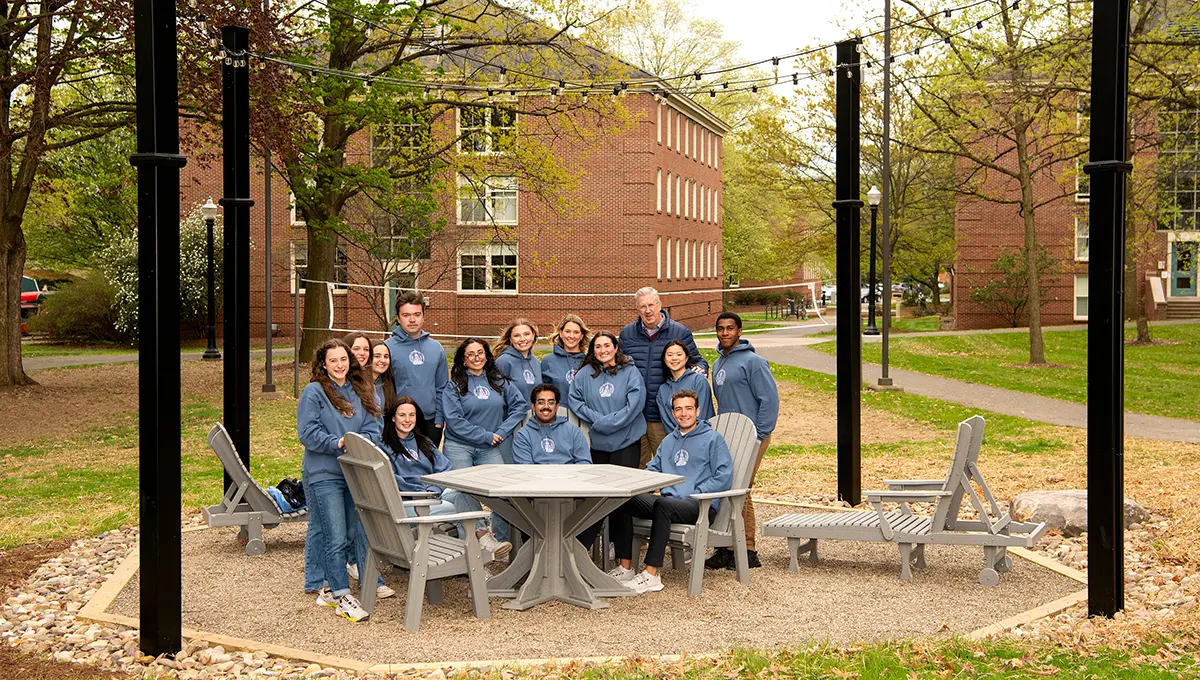


Gather and Connect
With their senior tribute — a social gathering space within Bucknell’s Grove — the Class of 2023 wanted to honor its unique campus experience while also benefiting future generations of Bucknellians.
“It’s a serene, peaceful place on campus that we wanted to supplement by creating a spot where people could meet, do work and hang out,” says Class President Nabeel Jan ’23, who double-majored in English–film/media studies and international relations. “During the pandemic, a lot of classes were held outside to help mitigate the spread of COVID-19. We thought this would be a fitting tribute as a remembrance of how those spaces helped us and other classes.”
photo by Emily Paine
